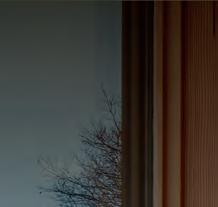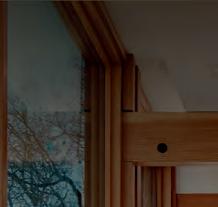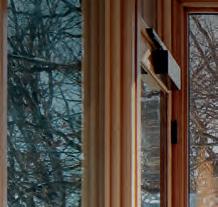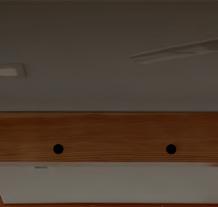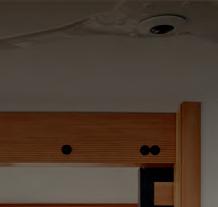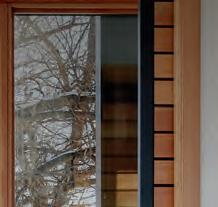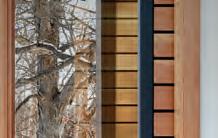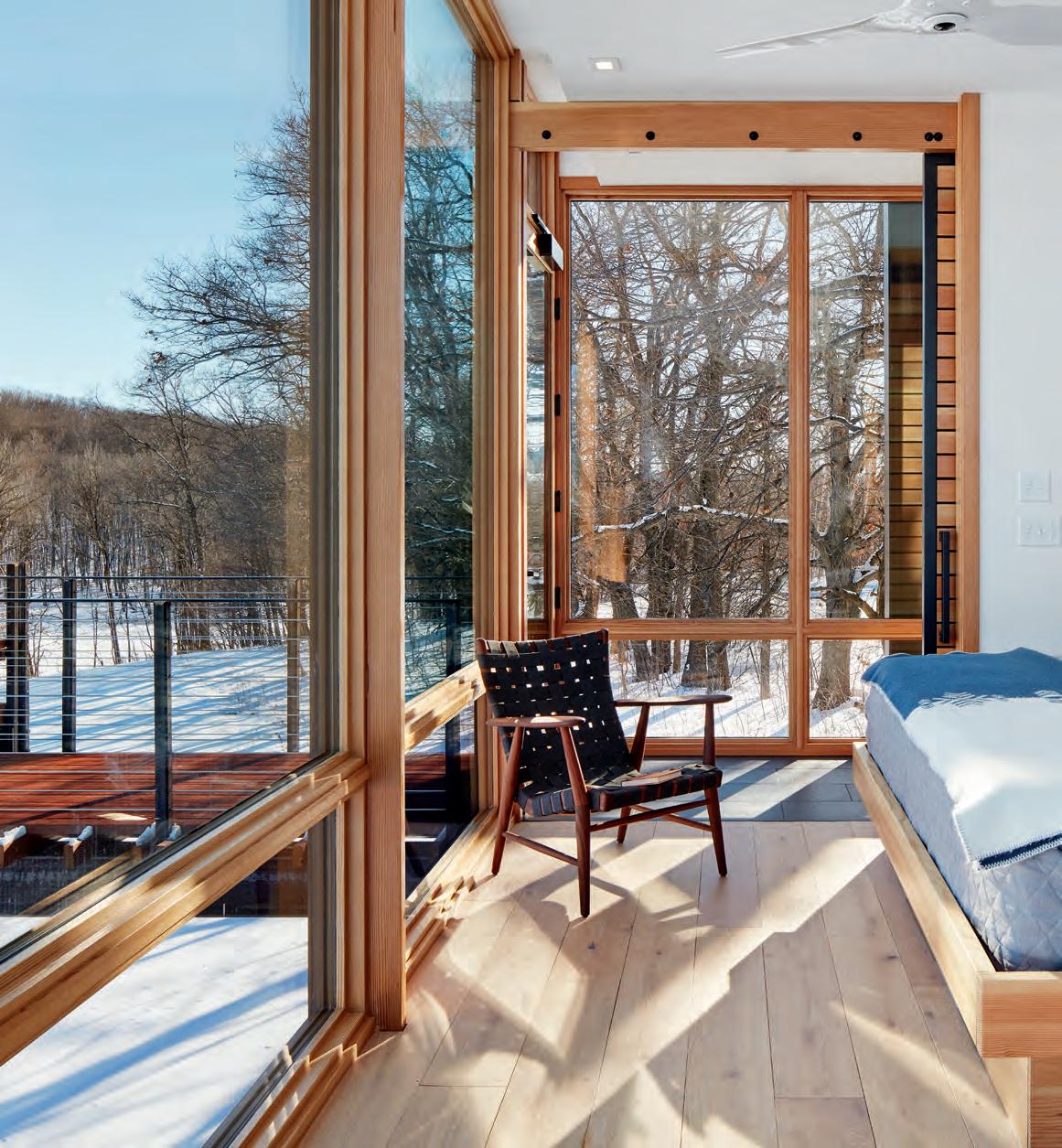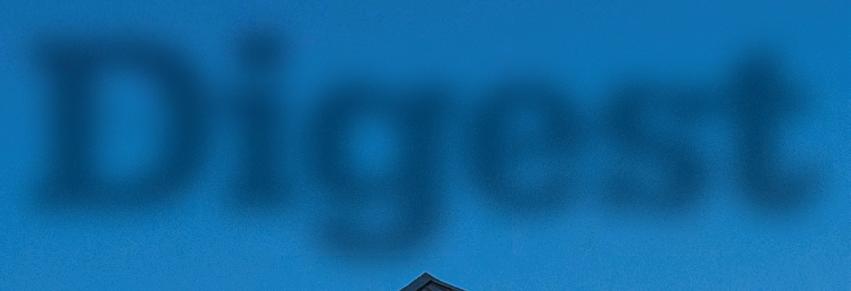





Visitors





























Visitors































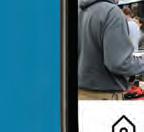






















































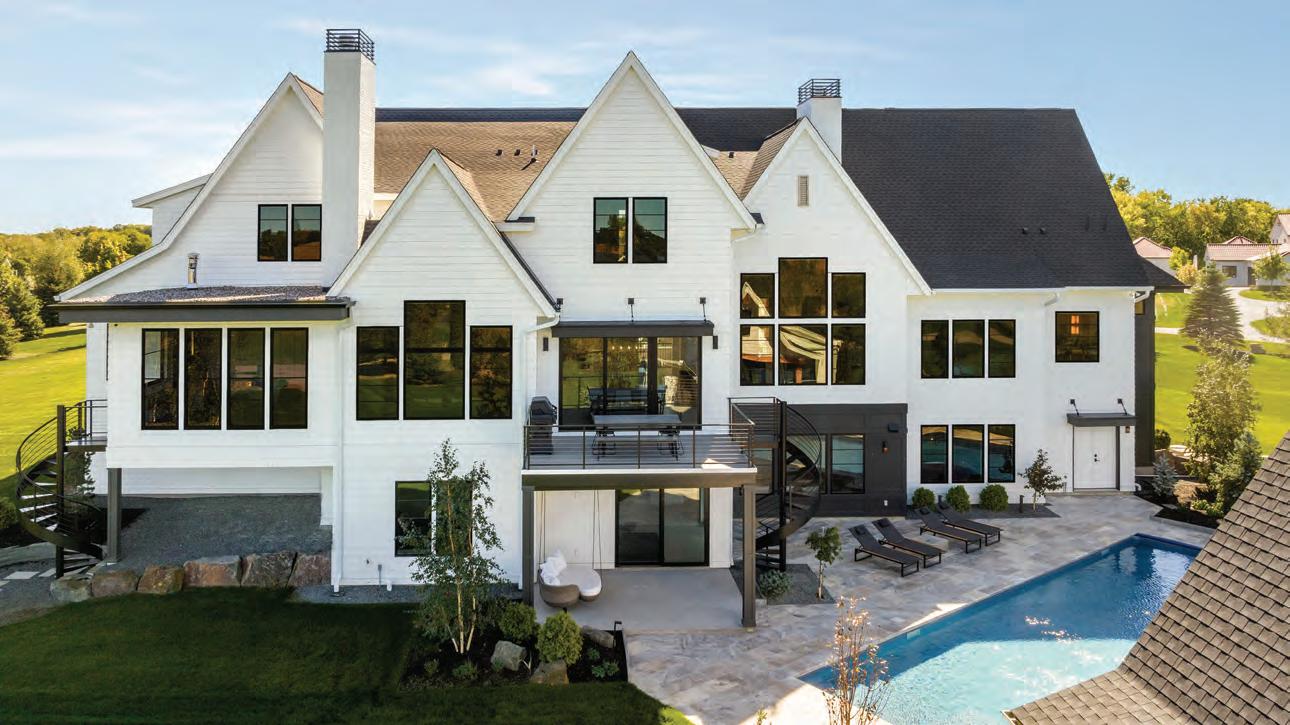
For homes that deserve nothing less than extraordinary, choose Pella® products. From stunning modern profiles to traditional details and craftsm anship, Pella brings expansive views and beautiful inspiration to your homes. With dedicated sales consultants, beautiful showrooms, and a lo cal service department - you can count on the Pella Northland team to help bring your vision to life.
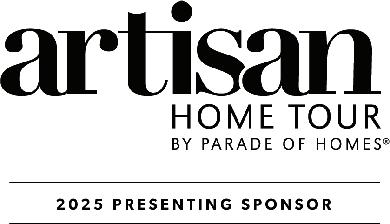
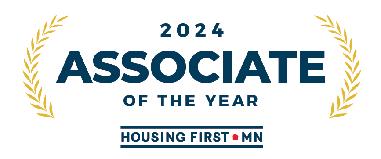





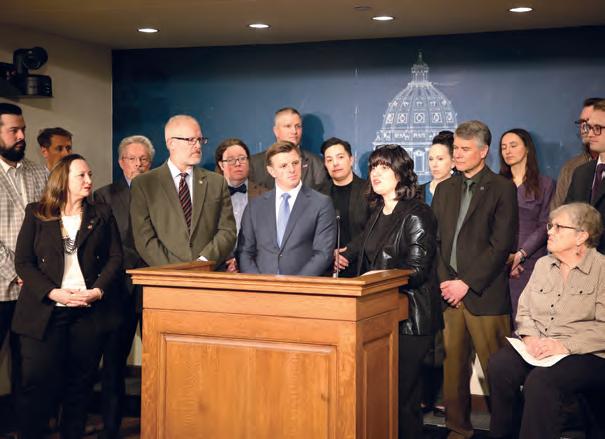


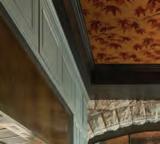
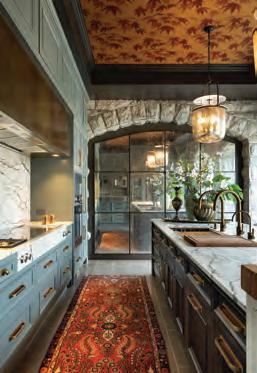









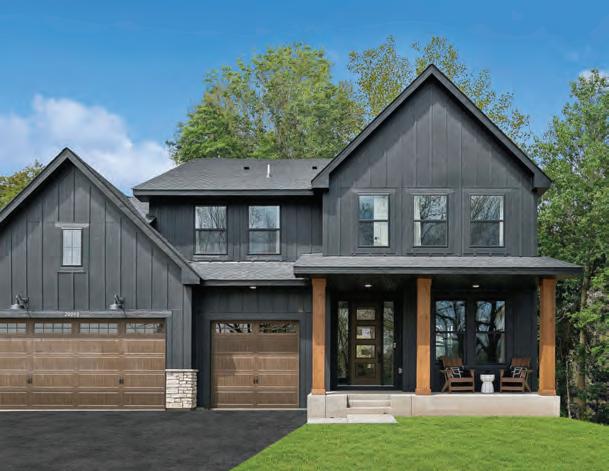

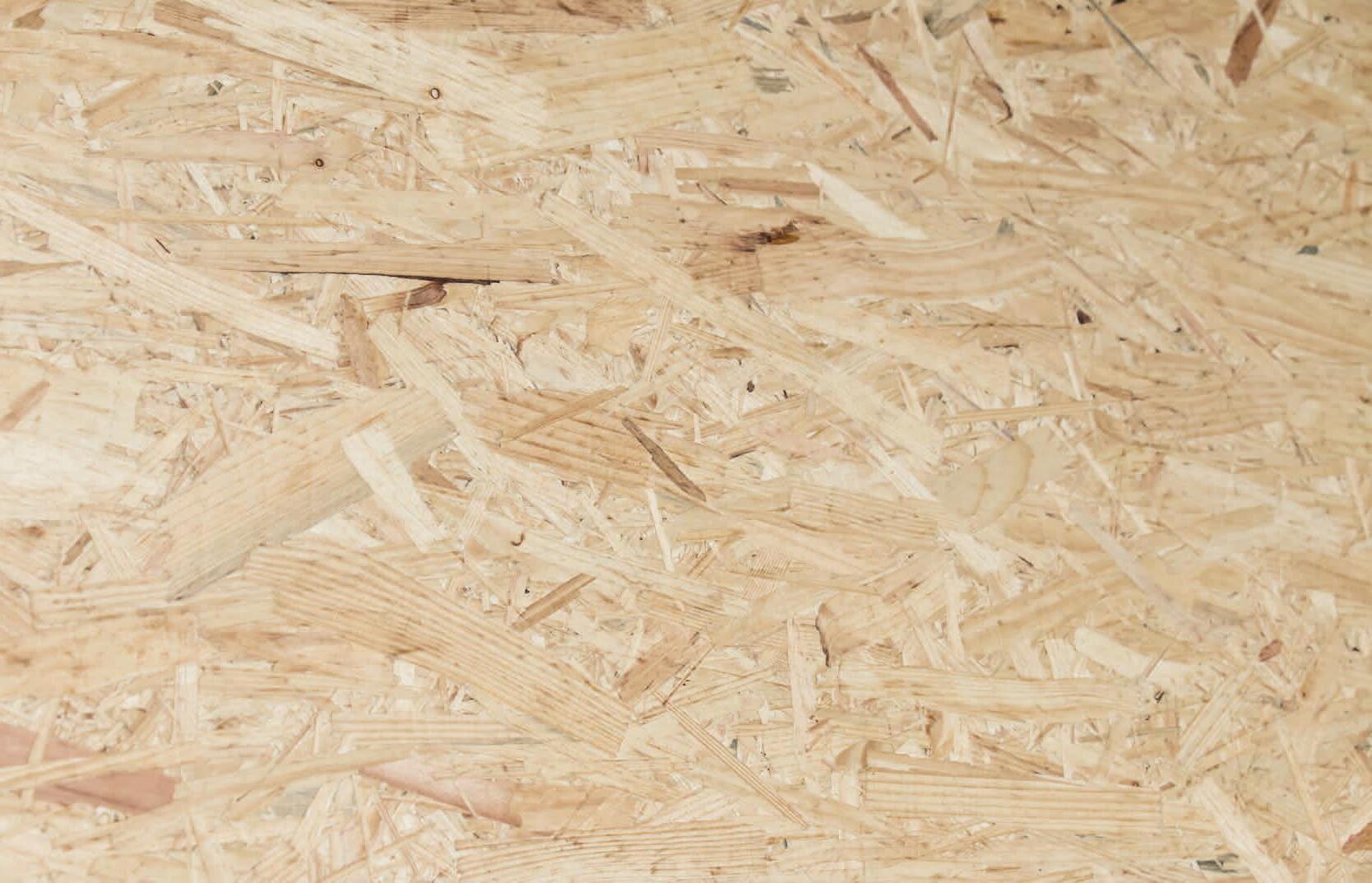











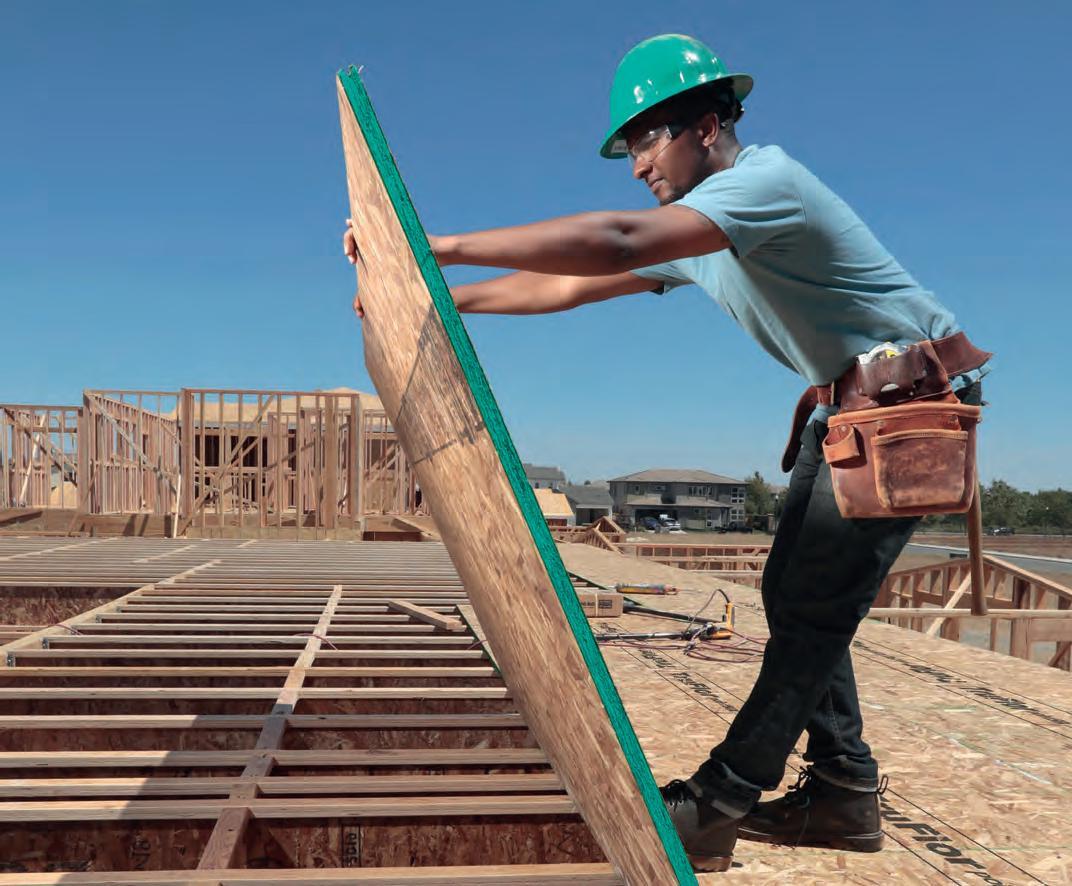
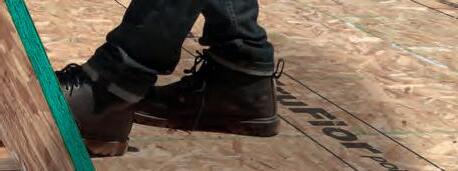

EXECUTIVE BOARD
BOARD CHAIR TIM FOHR, Lennar
BUILDER VICE PRESIDENT JOHN KRAEMER, John Kraemer & Sons, Inc.
IMMEDIATE PAST PRESIDENT ART PRATT, Pratt Homes
SECRETARY/TREASURER PETER MARTIN, Pella Windows & Doors
AT-LARGE MEMBER KRISTIN REINITZ, Admit One Home Systems

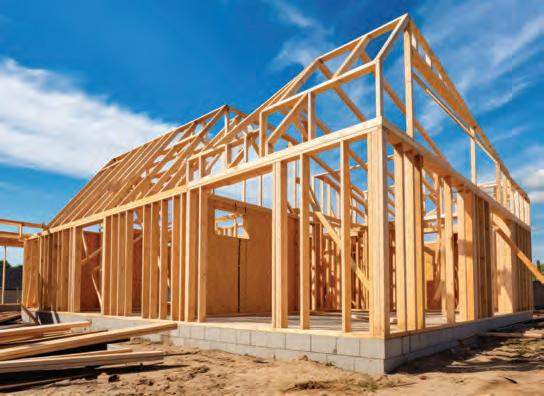



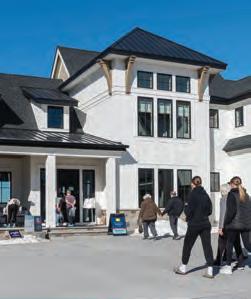
AT-LARGE MEMBER JAMIE THARP, Pulte Homes of Minnesota, LLC
AT-LARGE MEMBER REBECCA REMICK, City Homes, LLC
BOARD + COMMITTEE CHAIRS
PARADE OF HOMES COMMITTEE KATIE GEDDES, Lennar
ADVOCACY COMMITTEE ANDREW LEJEUNE, GlassArt Design
REMODELERS COMMITTEE ANDY MICHELS, Michels Homes
SMALL VOLUME BUILDERS COMMITTEE JOE BRAUN, Style & Structure
LARGE VOLUME BUILDERS COMMITTEE JOHN RASK, M/I Homes
AMBASSADOR COMMITTEE KARYN BRADDOCK, Reside
ARTISAN HOME TOUR COMMITTEE AMY HENDEL, Hendel Homes
HOUSING AFFORDABILITY INSTITUTE BILL BURGESS, Lennar
HOUSING FIRST MN FOUNDATION JEN MCALPIN, McAlpin Marketing
HOUSING FIRST MN NETWORK TONY WIENER, Cardinal Homebuilders, Inc.
CENTER FOR HOUSING CAREERS PAUL GRABOW, Robert Thomas Homes, Inc.
AT-LARGE MEMBER NATHAN CARLSON, Highmark Builders, Inc.
AT-LARGE MEMBER MALORIE DRUGG, Marvin
AT-LARGE MEMBER JIM FUSCHETTO, Lyman Companies
AT-LARGE MEMBER RYAN HANSON, Sustainable 9 Design + Build
AT-LARGE MEMBER ALEX LELCHUK, Lelch Audio Video
AT-LARGE MEMBER JARRETT PARKS, D.R. Horton, Inc. - Minnesota
EXECUTIVE LEADERSHIP
CHIEF EXECUTIVE OFFICER JAMES VAGLE
ASSOCIATION STAFF
SENIOR DIRECTOR, MARKETING & COMMUNICATIONS LAURA BURT
MEMBER SERVICES MANAGER KIM CARTER
MEDIA RELATIONS MANAGER KRISTEN CROSSMAN
SENIOR DIRECTOR, HOUSING POLICY NICK ERICKSON
ART DIRECTOR MANDY FINDERS
VICE PRESIDENT, LEGISLATIVE & POLITICAL AFFAIRS MARK FOSTER
VICE PRESIDENT, EVENTS & WORKFORCE INITIATIVES TOM GAVARAS
POLICY ASSOCIATE GRACE GREENE
SENIOR VICE PRESIDENT, GROWTH & ENGAGEMENT KATE GUNDERSON
SENIOR DIRECTOR, FINANCE TAMMI HALL
MARKETING & ENGAGEMENT MANAGER SARAH HINDERMAN
PROGRAM OPERATIONS MANAGER NIKKI HUBIN
SENIOR DIRECTOR, COMMUNITY IMPACT SOFIA HUMPHRIES
EVENTS COORDINATOR GABRIELLE LANENBERG
SENIOR ACCOUNT EXECUTIVE DEVIN LEHNHOFF
FOUNDATION PROGRAM COORDINATOR KRISTI MANNING
ACCOUNT EXECUTIVE KRISTIN MARVIN
CHIEF OPERATING OFFICER JANICE MEYER
DIRECTOR, EVENTS MARY CATHERINE PENNY
EVENTS COORDINATOR MORGAN RAY
FOUNDATION EXECUTIVE DIRECTOR & VICE PRESIDENT, DEVELOPMENT
JESSICA RYAN
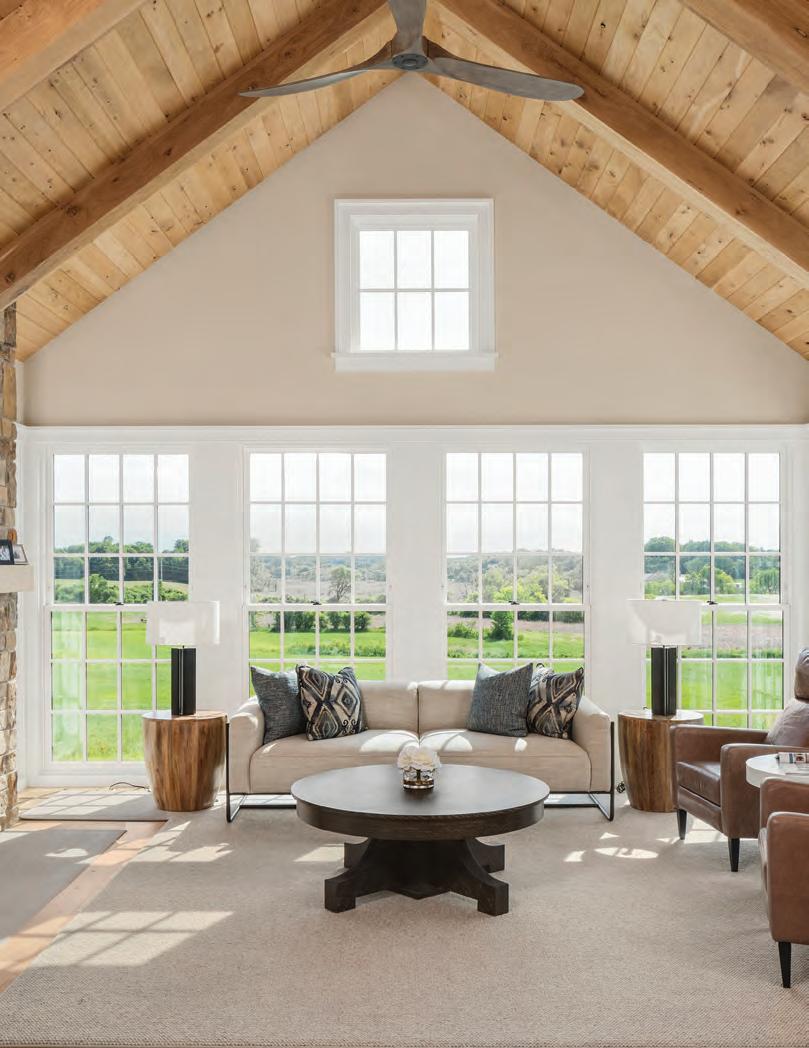
OPERATIONS COORDINATOR CASEY SCOZZARI
GRAPHIC DESIGNER PA GAR VANG
EXECUTIVE COORDINATOR KATE WIGLEY

Two of the most established and well-respected companies in Minnesota are here to meet your window and door needs. When you combine the legacy of Shaw/Stewart Lumber Co. with the craftsmanship of Marvin, you get Minnesota’s premier showroom.
Shaw/Stewart Lumber Co. has been providing quality products and creative custom solutions to its customers since 1886. They serve luxury homebuilders and remodelers as well as commercial contractors in the Twin Cities area.
As a homebuyer or remodeling customer, you can depend on Shaw/Stewart to be the trusted source to provide your builder or remodeler with quality products, responsive service, and creative solutions for your project.
When you're ready to select windows and doors, join your contractor on a visit to the Marvin Design Gallery and confer with their professional design staff. You'll see the latest offerings from Marvin and feel the difference in quality, design, and craftsmanship.
All of the window and door displays are set in realistic vignettes, designed to help you imagine the possibilities for your own home.


As we close out the first quarter of 2025, I want to share how encouraged I am by the momentum we are building together.
On the advocacy front, we’ve launched our Yes to Homes initiative, backed by the largest bipartisan coalition to date. This marks a major step forward in our efforts to open up Minnesota’s housing market and modernize outdated policies that serve as roadblocks to affordability. While the legislative process is always long and uncertain, the progress we’ve made already in 2025 is significant. This initiative has positioned us as the leading voice in the state’s housing debate.
Members of Housing First Minnesota, all of us, drive our advocacy programs, home tours, awards, health plan, workforce programs, and booming philanthropic work through our foundation. These programs are strong and growing, but we know we can take them even higher.
And that’s where our trade partners and industry segments that aren’t currently involved come in. We must find new ways to engage them — whether that’s a simple sign-up to stay informed on industry issues or the path to full membership. Our industry is big — 17.2% of the GDP! Our Board’s vision is to better capture the full depth of our industry’s influence by meeting our members where they are and creating new pathways for engagement.
Look for more information on this later this spring. We’re looking forward to building a stronger Housing First together for the future!







TIM FOHR 2025 ASSOCIATION BOARD CHAIR, LENNAR









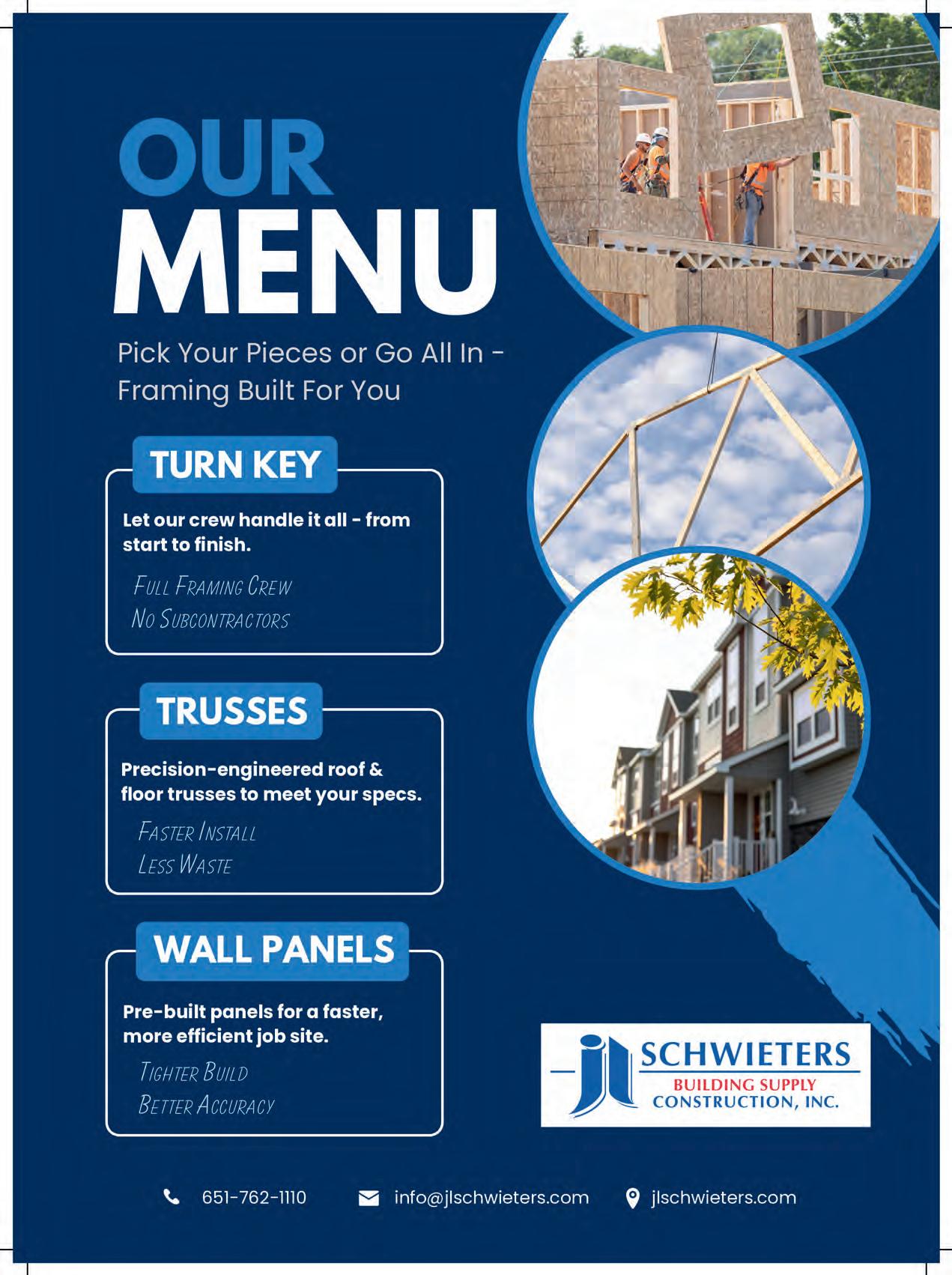

Housing First Minnesota would not be as strong or successful without our Elite Sponsors. Thank you to our biggest associate supporters!




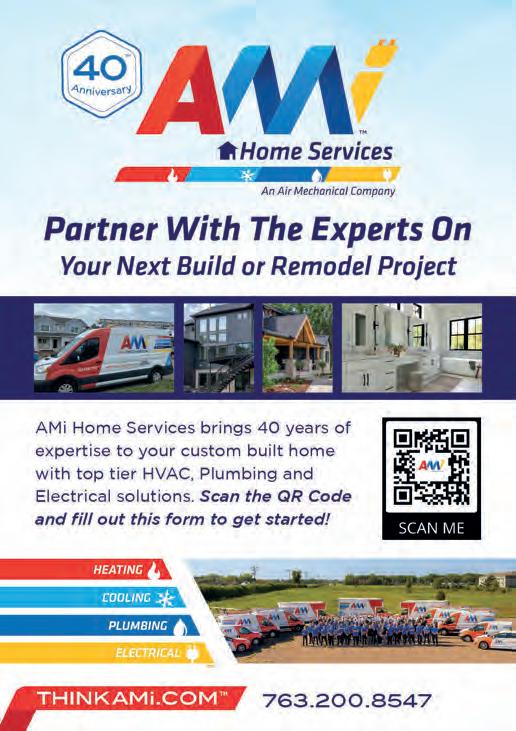
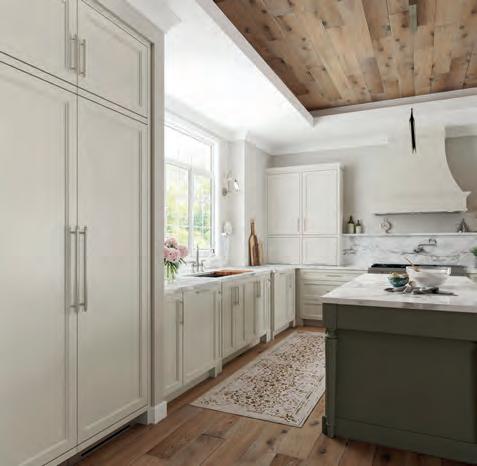
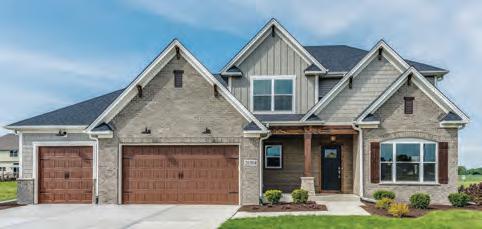
and
your
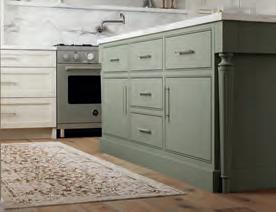
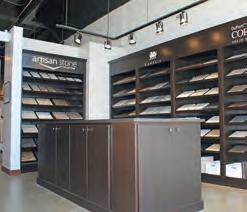

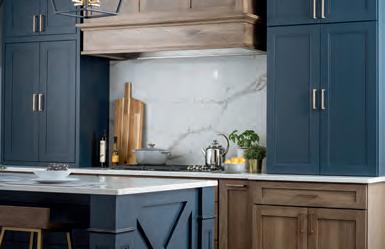
Elevations Millwork & Cabinetry by ABC is the Twin Cities leading, full-service showroom for all your cabinetry needs. Our high-end design center features over 20 displays in the latest trends. We have hundreds of options, including countertops and hardware, for every style and budget. The Elevations team of designers can assist you and your customers with samples, product selection, 3D designs, budgeting, space optimization and more to help complete the project faster. Our showroom is your showroom! Looking for a partner to help save time & money? Contactustoday! LYMANCOMPANIES.COM


















SPONSORS


























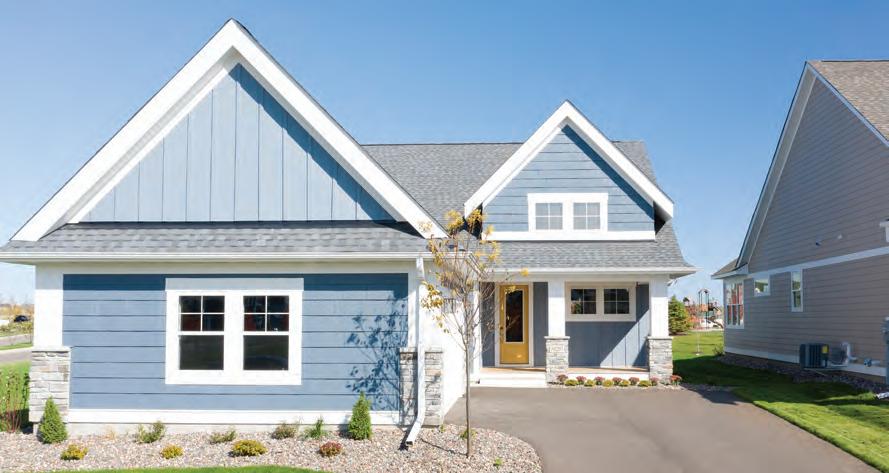


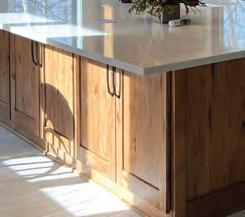

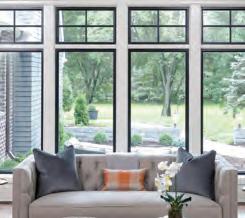

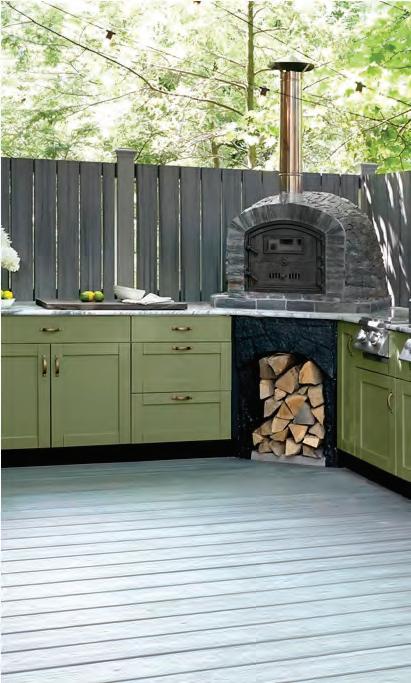

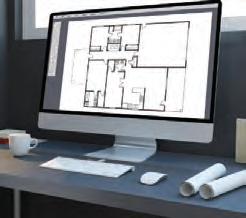



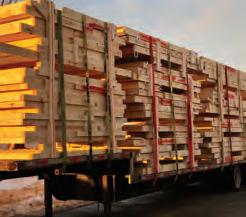



Don’t miss project updates, upcoming events, ways to get involved, and more in this monthly e-newsletter.
LEARN MORE AND SUBSCRIBE AT HousingFirstMNFoundation.org


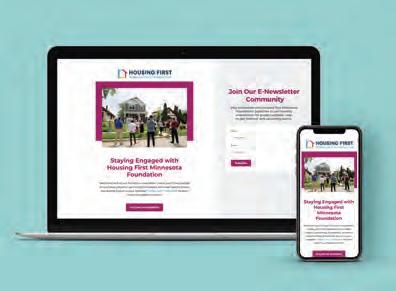
Reach housing-interested consumers or get your brand in front of valuable industry stakeholders with our advertising and sponsorship opportunities. We offer options for every budget!
LEARN MORE AT HousingFirstMN.org/Sponsorships


From individual home testing and advanced certification levels to annual company accreditation and energy efficiency education, the Minnesota Green Path program helps communicate to the public and your customers that you’ve made a commitment to the environment.
DETAILS AT MNGreenPath.org



Looking to earn your continuing education credits? Explore and learn with Contractor University’s online courses — with over 50 specialized classes taught by industry experts. The best part? Courses start from just $18!
EXPLORE COURSES AT ContractorU.com



Cut costs, not comfort with a $500 bonus rebate on tankless water heaters!
*
Tankless water heaters o er you and your homebuyers many advantages:
• Saves energy
• Continuous supply of hot water
• Space savings
• Longer life
• Tax credits
Here’s another bonus. A high-e iciency natural gas tankless water heater may also impact the gas savings of your participating High E iciency Home and that could mean a higher rebate.
*Must install a high-e iciency natural gas tankless water heater rated at .90 UEF or greater in a qualifying CenterPoint Energy High E iciency Home.

Learn about more ways you can benefit from building with natural gas. Visit CenterPointEnergy.com/Builders or contact Jake Schwietering at 612-321-4386.

From tackling Minnesota’s housing crisis to challenging new independent contractor tests, advancing HOA and condo reform, and ensuring bipartisan support for housing priorities, the team’s efforts are driving meaningful change. Here’s a closer look at how they’re championing solutions to today’s most pressing housing challenges.
A bipartisan coalition of legislators introduced a package of proposals aimed at increasing the supply of housing that is accessible and affordable, streamlining housing approvals, reversing the effects of exclusionary zoning, and supporting location efficiency. The package includes eight bills, all with bipartisan authorship in both bodies.
Among the bipartisan bills introduced are the Minnesota Starter Home Act, Increased Housing Options Act, and the Homeowner Freedom Act. These bills legalize the construction of smaller homes on smaller lots, allow for more “missing middle” home construction, and prohibit aesthetic mandates, respectively.
“The median cost of a new single-family home is over $540,000, and that puts homeownership out of reach for many hard-working Minnesotans,” said Sen. Jordan Rasmusson (R-Fergus Falls) when speaking in support of the Minnesota Starter Home Act. “This proposal focuses on cutting red tape to increase the supply of starter homes and empowering the free market to meet the demand.”
In March, the Housing Committees in both the House and Senate heard the Minnesota Starter Home Act. The Senate version (SF 2229) is carried by Sen. Port (D) and Sen. Rasmusson (R). In the House, the bill (HF 1987) is carried by Rep. Igo (R) and Rep. Howard (D).
Nick Erickson, senior director of housing policy for Housing First Minnesota, testified in support of the bill in both bodies.
“This isn’t about control or community character; this is about one simple question: do you believe that homeownership opportunities should be available to future generations of Minnesotans?” Erickson said.
There was testimony from a broad coalition of supporters and lively discussion among committee members.
On the House side, Howard introduced the bill, “We have a generation of Minnesotans that can’t afford to buy a home in the community where they grew up. That should concern all of us.”
In the Senate, Rasmusson concluded the hearing, “We need solutions like this that reduce red tape and allow the free market to build the kind of homes that people want and can afford.”
The Minnesota Starter Home Act will be heard by the Senate State and Local Government Committee and House Elections Finance and Government Operations Committee next.
The Senate Housing Committee heard SF 2286, authored by Sen. Clark (D) and Sen. Draheim (R). This bill, known as the Transforming Main Street Act, allows for multifamily housing to be built within existing commercial corridors, includes flexibility for mixed-use developments, and eliminates barriers that drive up the cost of housing.
The House Housing Committee heard the companion bill, HF 2018, led by Rep. Kozlowski (D) and Rep. Dotseth (R).
The Transforming Main Street Act was referred to the Senate State and Local Government Committee and the House Elections Finance and Government Operations Committee.
The House Housing Committee took up Rep. Nash’s (R) bill (HF 2013) that prohibits aesthetic mandates.
Mark Foster, vice president of legislative and political affairs for Housing First Minnesota, testified in support of the bill.
“Homeownership is the desire of all Minnesotans. Zoning and housing aesthetics should not be used as a tool of exclusion,” Foster said.
Aesthetic mandates such as vinyl siding bans and stone or brick facade requirements can exceed $20,000 per house — this increase equates to 50,000 Minnesotan households no longer being able to afford that mortgage.
Foster closed, “This language before you is a small but important piece of the puzzle. For the sake of the next generation of homebuyers, we need your help in removing these exclusionary roadblocks.”
The bill was referred to the House Elections Finance and Government Operations Committee.
The House Housing Committee heard HF 2140, authored by Rep. Kraft (D) and Rep. Dotseth (R), also known as the More Homes, Right Places Act. This bill legalizes triplexes and fourplexes near transit corridors, gives cities flexibility about where to place new housing, and eliminates various barriers that drive up the cost of housing.
The bill was referred to the House Elections Finance and Government Operations Committee.
The Senate Housing Committee heard the companion bill, SF 2231, led by Sen. Boldon (D) and Sen. Draheim (R).
The bill was referred to the Senate State and Local Government Committee.
The Senate Housing committee heard Sen. Fateh (D) and Sen. Rasmusson’s (R) parking reform bill (SF 1268). This bill prohibits cities from imposing minimum parking mandates, allowing businesses and developers to decide how much parking they need.
The bill was referred to the Senate State and Local Government Committee.
Finally, the Senate Housing Committee heard SF 1750 from Sen. Lucero (R) and Sen. Pha (D), which reforms common interest communities (CICs) and homeowners associations (HOAs). Most notably, the bill amends existing provisions that allow for loopholes in which local governments can mandate HOAs through unnecessary common property requirements.

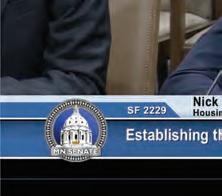
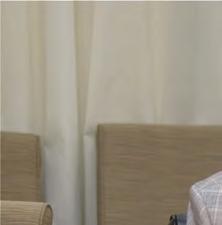
Housing First Minnesota wrote in a letter of support for the bill, stating “We have a home shortage in Minnesota and a housing affordability crisis. We need more homes, not more HOAs.”
The bill was referred to the Senate Judiciary Committee.
These bills are expected to be heard at their next committee stops in the coming weeks as Housing First continues to advocate for more homeownership opportunities and greater affordability for Minnesotans.
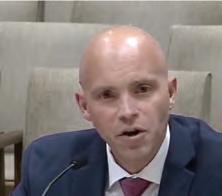
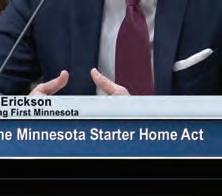



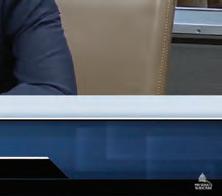



The Senate Housing Committee held an informational hearing on SF 536, authored by Sen. Lucero (R) This bill provides a sales and use tax exemption for residential housing construction materials. Foster testified in support of the bill.
“Homebuyers are getting squeezed and it truly is an all-hands-on deck moment for housing,” said Foster, citing a potential cost savings of $10,000 for a 1,600 square foot home with the proposed tax exemption.
SF 536 was referred to Senate Taxes.
The House Housing Committee heard HF 177 from Rep. Myers (R) which provides a construction tax exemption for new single-family homes for first-time homebuyers. The bill was amended to only exempt the first $165,000 of construction, or about the material cost of a $500,000 home.
Foster cited a potential savings of $9,000 to $10,000 on a 1,600-squarefoot rambler.
“While that might not seem like a lot, keep in mind that for every $1,000 in cost savings more than 2,500 more Minnesota families could afford that home,” Foster said.
The bill, as amended, was referred to House Taxes.
The Senate Labor Committee took up another bill from Lucero. SF 560 and the proposed amendment were presented by Sen. Dornink (R). This bill establishes a modified fee structure for residential building permits, intended to ensure that fees are proportionate to the actual cost of service, whereas fees are currently based on the valuation of a project. The bill has bipartisan support, with Sen. John Hoffman (DFL) co-authoring.
Erickson testified in support of the bill.
“This conversation takes place against the backdrop of a housing shortage that is the result of a system that is not able to currently deliver affordably priced homes, particularly starter homes, in Minnesota’s housing market,” Erickson said. “This is trying to simplify the pro-
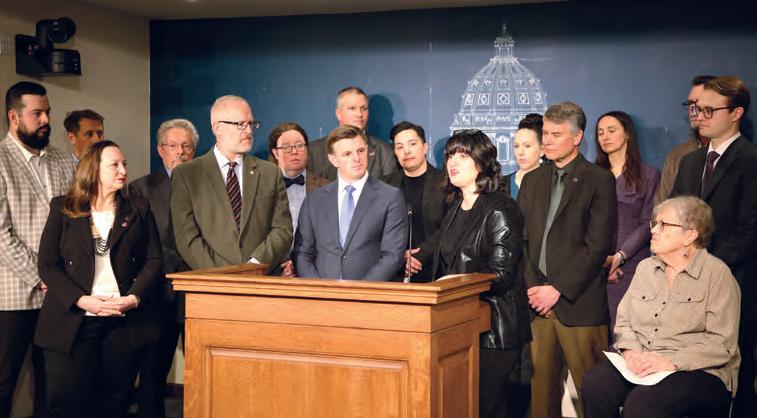
cess and bring affordability back into the conversation as it comes to housing in Minnesota.”
SF 560 was referred to Senate Housing.
In March, Judge John Tunheim issued an order denying a request by industry groups to halt the implementation of the new independent contractor law passed last year, which went into effect on March 1.
The suit, brought by Associated Builders and Contractors, Builders Association of Minnesota, and J&M Consulting, challenges the validity of the law in Federal Court and the request for a temporary restraining order on the new law was requested by the industry while the court seeks to address the merits of the industry’s arguments.
With the ruling, the law will remain in effect. Judge Tunheim’s opinion was limited to the request to stay the enforcement of the law and did not address the specific complaints of the law.
The plaintiffs have already appealed the decision, and all parties have agreed to stay the Federal District Court proceedings while the 8th Circuit considers the appeal.
According to the suit, the law was challenged because the National Labor Relations Act preempts states from imposing their own penalties and remedies on worker classification. The complaint also states that the 2024 law imposes a “collective bargaining scheme on independent contractors, whose labor practices Congress intended should remain unregulated.”
The groups also allege the fines violate the U.S. Constitution on multiple fronts. First, the law includes “massive, compounding fines for even inadvertent, innocent, or technical violations,” which they claim violates the 8th Amendment. Secondly, the law is vague and difficult for the average person to understand, which the suit says is a violation of the due process protections of the Constitution.
Housing First Minnesota staff was present at the hearing and will continue to provide resources regarding these changes to the independent contractor test.
The median cost of a new singlefamily home is over $540,000, and that puts homeownership out of reach for many hard-working Minnesotans.”
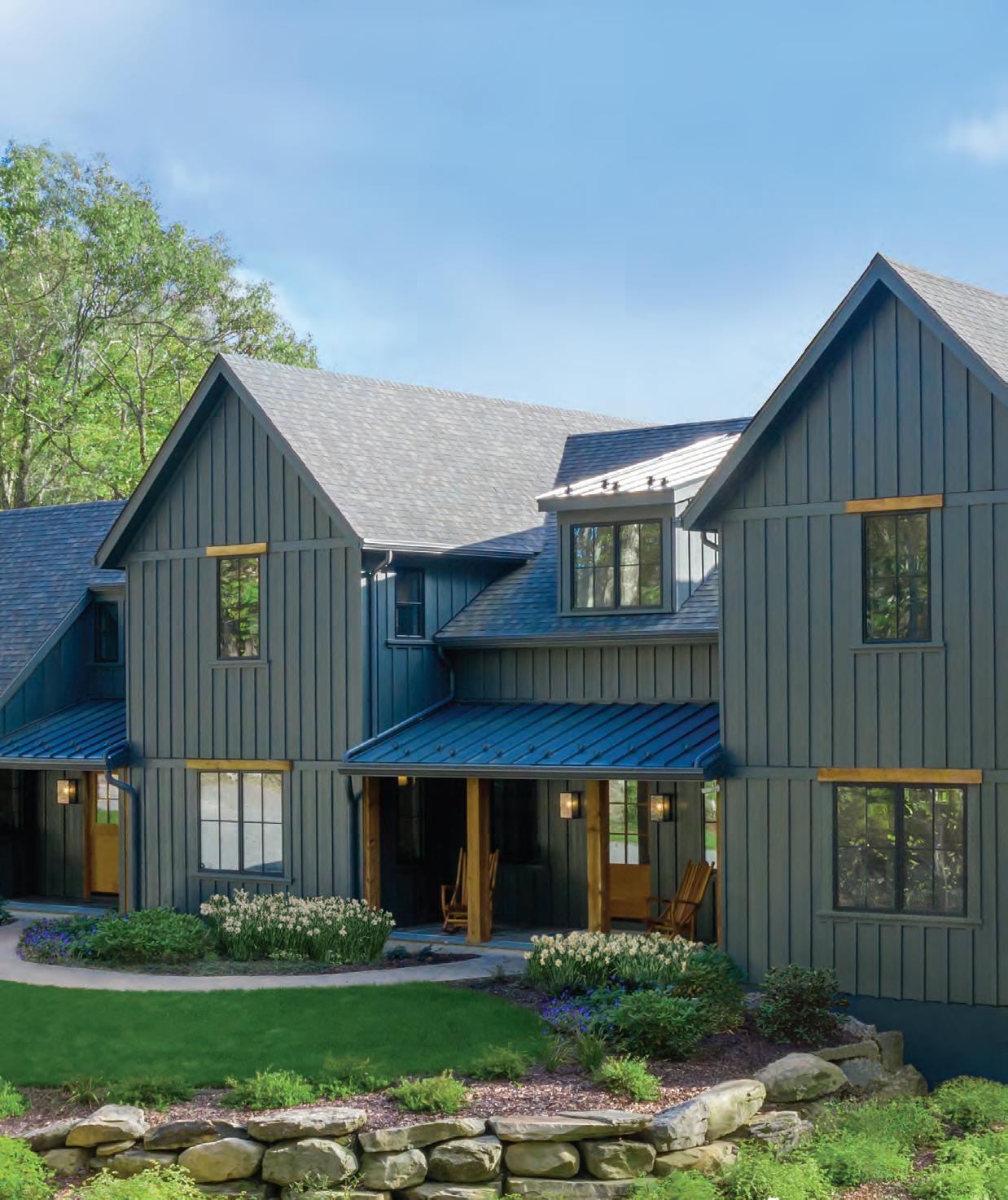
JORDAN RASMUSSON SENATOR (R-FERGUS FALLS)




We
have an incredible group of builders in the Twin Cities who are building and shaping the places we call home. Their dedication to building safe, longlasting homes is making homeownership possible for more Minnesotans.”
JAMES VAGLE CEO, HOUSING FIRST MINNESOTA
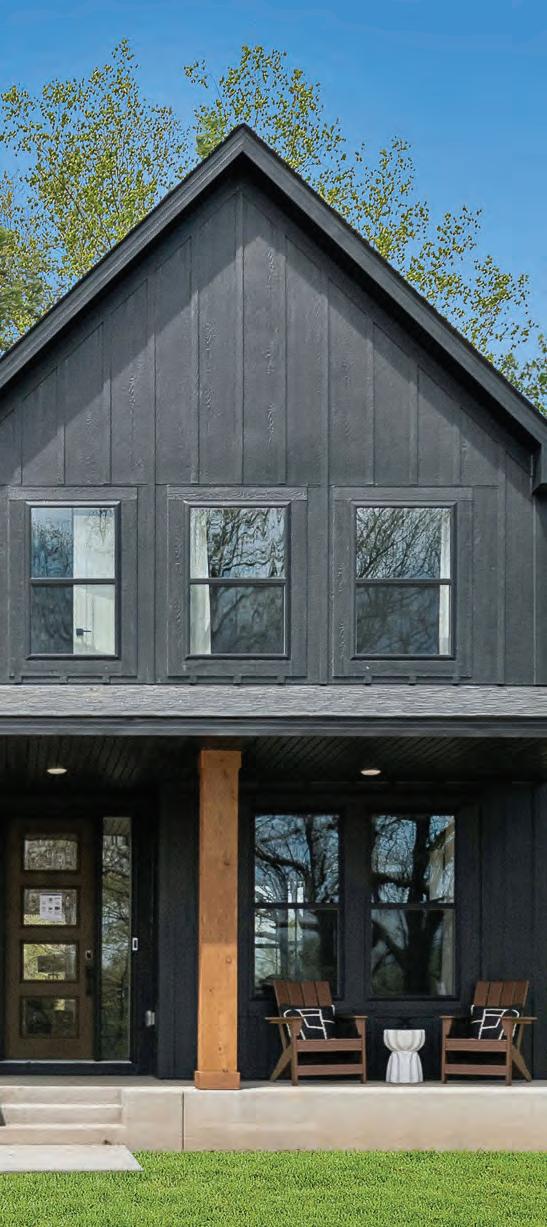
Lennar Tops the List of Twin Cities Builders for 19th Year in a Row
For the 19th consecutive year, Lennar has secured its position as the Twin Cities’ top-ranked homebuilder, according to the latest survey by Housing First Minnesota. The rankings, based on annual gross revenue from for-sale housing, highlight Lennar’s continued leadership in shaping the region’s residential landscape.
In 2024, Lennar reported $1.02 billion in gross revenue, closing on 2,191 housing units — 1,383 single-family homes and 808 multifamily homes. Together, the Top 25 Builders accounted for $3.6 billion in gross revenue and 6,580 housing units in 2024. Of those housing units, 4,933 were single-family homes and 1,647 were townhomes or multifamily units.
“We have an incredible group of builders in the Twin Cities who are building and shaping the places we call home,” said James Vagle, CEO of Housing First Minnesota. “Their dedication to building safe, long-lasting homes is making homeownership possible for more Minnesotans.”
“At Lennar, we are committed to making homeownership a reality for all Minnesota families. Our focus has been building great homes in the neighborhoods and school districts that are important for Minnesota families,” said Lennar Division President, Bill Burgess. “We are proud that every year, for the past 19 years, more Minnesota families put their trust in Lennar to help them make their dream of owning a new home become reality.”
In addition to Lennar, the top 10 homebuilders were D.R. Horton, Inc. - Minnesota with over $449 million in revenue and 893 housing units closed; M/I Homes with over $379 million in revenue and 778 housing units closed; followed by Pulte Homes of Minnesota, LLC with revenue of over $358 million and 651 units; Robert Thomas Homes, Inc. with over $166 million and 233 units; Capstone Homes, Inc. with over $160 million and 366 units; Hanson Builders, Inc. with over $152 million and 136 units; Gonyea Homes, Inc. with over $129 million and 162 units; Creative Homes, Inc. with over $127 million and 197 units closed; and Eternity Homes, LLC with over $72 million and 88 units closed.
In an era where marketing extends far beyond traditional tactics, builders and business owners are tapping into innovative ways to connect with their audiences. At this year’s Builders & Remodelers Show (BRS), industry experts gathered for a panel discussion on non-traditional media. Mark Williams of Mark D. Williams Custom Homes, Danielle Yegge of Style & Structure, and Todd Polifka of Custom One Homes shared how they’ve leveraged podcasts, strategic partnerships, and activation events to promote their brands in fresh and engaging ways.
With homebuilders and remodelers vying for buyers’ attention, differentiation is key. While traditional marketing methods still have their place, today’s competitive landscape demands a more creative approach.
Yegge emphasized the importance of finding a niche and leaning into what makes you unique. When Style & Structure first launched its social media strategy, the team faced skepticism, but their persistence paid off, solidifying their brand’s presence as a powerhouse team online.
Polifka pointed out the need for adaptability, explaining that marketing has changed dramatically over the past decade. “It’s not just about buying a print ad, a TV ad, or a magazine placement at the dentist’s office,” he said. His focus on activation — turning marketing efforts into direct engagement — has helped him foster deeper relationships with potential clients.
Williams, on the other hand, takes a storytelling approach. “People resonate with stories and with people,” he said. “Leverage your storytelling in every format.” He emphasized that breaking through the noise in a competitive industry requires builders to embrace authentic and compelling narratives.
Podcasts have emerged as a powerful way for homebuilders to share expertise and build relationships. Polifka launched the Roof to Curb podcast to educate consumers about the complexities of homebuilding, offering an inside look at the industry.
“For those interested in podcasting, start with the why,” he advised. “Are you doing it for content, for entertainment, or to monetize?” He stressed that the investment is relatively low but requires clear objectives.
Yegge echoed this sentiment, highlighting the importance of meticulous preparation. Her podcast, If Walls Could Talk, is structured to ensure a seamless experience for listeners. “Prep work is key,” she said. “Everything is thought through in detail.” She also encouraged business owners to collaborate with others in the industry, bringing in guest speakers and outsourcing production tasks to make the process more manageable.
Williams, who hosts Curious Builder, sees podcasting as a natural extension of his storytelling approach. He suggested that those hesitant to start their own show
could test the waters by appearing as guests on established podcasts. “Put together a press kit and a bio, and start reaching out to hosts,” he recommended.
Brand activations — whether through experiential marketing, events, or interactive campaigns — offer unmatched opportunities to leave lasting impressions.
Williams emphasized the emotional impact of live events. “People may forget what you say, but they’ll never forget how you made them feel,” he said.
Polifka added that data collection is just as important as the event itself. “Events are great, but if you’re not capturing data about who’s there and why they’re there, then you’re just having a great party,” he noted. He encouraged businesses to strategically gather client data to fuel future marketing efforts and create an ongoing engagement cycle.
For Yegge, the Parade of Homes and Artisan Home Tour serve as prime activations, generating highly qualified leads. “You have one month to maximize efforts and generate leads,” she explained. Her team ensures each home is staffed with knowledgeable professionals, uses geotracking to retarget visitors with ads, and provides attendees with branded merch.
She reinforced that marketing doesn’t end when the event does — follow-up is just as crucial as the initial engagement.
AUTHENTIC, TAKE RISKS, AND LEARN FAST
When it comes to embracing nontraditional media, the panelists agreed that agility and authenticity are key. Williams encouraged experimentation, stating, “If you’re going to fail — fail fast. Find out quickly if it’s a good tactic or not.”
Yegge reminded marketers to prioritize authenticity, asking, “Would you listen to your own podcast?” She noted that some of her most
viral content moments have been imperfect and spontaneous, proving that audiences value realness over perfection.
Polifka summed it up simply: “Either be memorable or be educational.”
As the marketing landscape continues to evolve, builders and business owners who embrace creative storytelling, strategic partnerships, and immersive brand experiences will be the ones who stand out — and ultimately win over their audience.
So, what’s your next nontraditional move?
MN (763) 479-2966

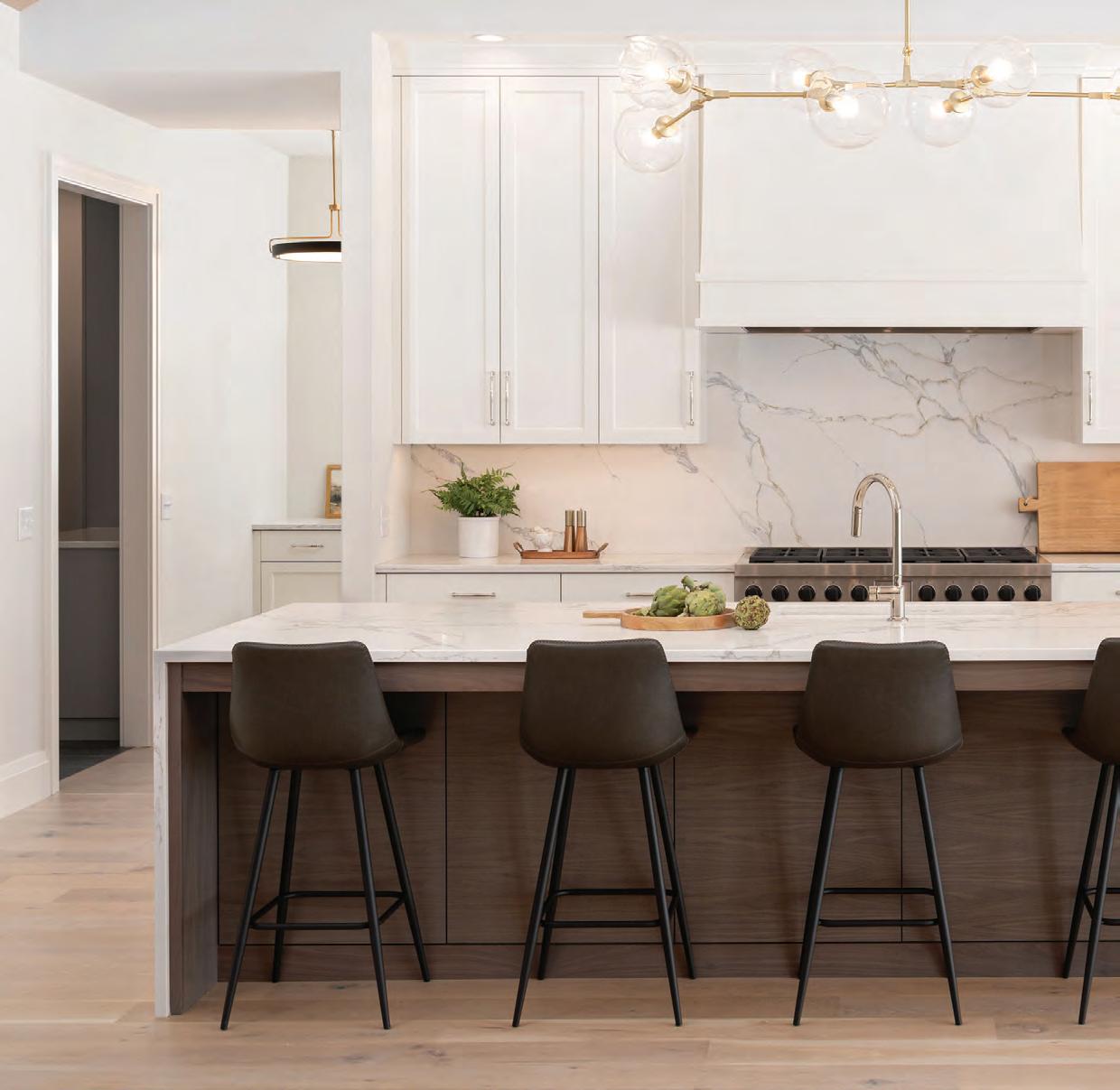
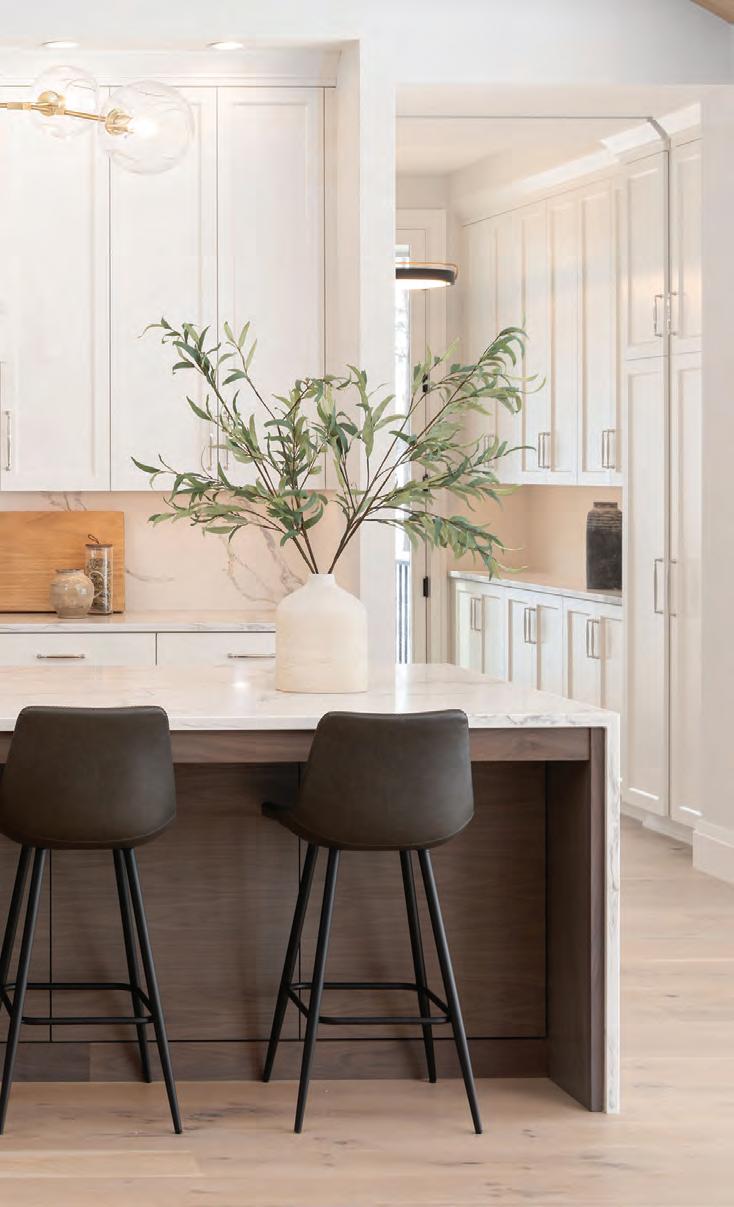
The future of kitchen and bath design is evolving, with 2025 trends highlighting a shift toward sustainability, wellness, and personalized spaces. At the Builders and Remodelers Show (BRS) in February, moderator Rosa Monroe of Terrazzo & Marble Supply Co. led a discussion digging into the latest kitchen and bath trends with experts Bre Perrigo of Revival House, Janel Swanson of Wildwood Kitchens and Baths, Kate Roos of Kate Roos Design, and Kristen Schammel of Ruby+Suede Design Studio. Their insights, combined with findings from the National Kitchen & Bath Association’s (NKBA) 2025 Kitchen Trends Report, shed light on the key factors influencing these shifts and how designers can help clients make informed, future-forward choices.
Homeowners are becoming more conscious of their environmental impact, leading to increased demand for energy-efficient appliances, eco-friendly materials, and water-saving fixtures. According to the NKBA report, natural materials like reclaimed wood, recycled countertops, and sustainably sourced stone are becoming more prevalent, not only for their lower environmental footprint but also for the warmth and texture they bring to spaces.
In addition to sustainability, wellnessdriven design is on the rise. Homeowners are prioritizing health-conscious choices, from improved air circulation in kitchens to non-toxic finishes and lighting that mimics natural daylight. Thoughtfully planned layouts that reduce stress and promote organization are also high on the priority list. Designers at the BRS panel noted that clients are looking for spaces that feel calming and restorative, with an emphasis on decluttering and maximizing natural light.
The era of one-size-fits-all kitchen and bath design is fading. Personalization is at the forefront of 2025 design trends, with homeowners seeking ways to make their spaces uniquely their own. NKBA’s findings highlight a rise in customized cabinetry, unconventional color palettes, and highly tailored layouts. Whether it’s a bold backsplash, a unique sink design, or integrated smart home features, clients want spaces that reflect their lifestyle and preferences.
At the panel discussion, the experts agreed that while personalization is key, it’s important to guide clients in making smart, long-lasting decisions. While statement elements like colored appliances or custom range hoods are gaining popularity, they should be balanced with timeless foundational pieces. Integrating trendy elements in ways that can be easily refreshed — like through light fixtures, hardware, or accent walls — helps designs remain adaptable so homeowners don’t feel stuck with a trend that fades.
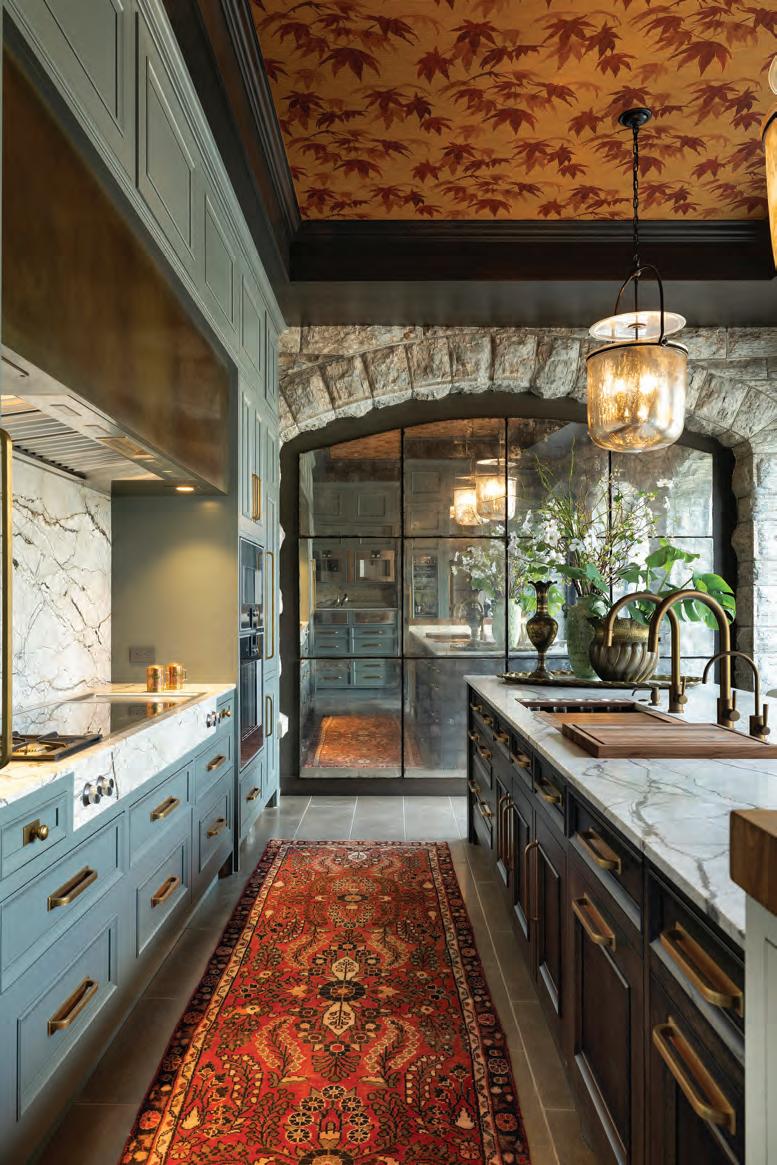
The way people use their kitchens and bathrooms is shifting, and so is the need for smarter, more efficient storage solutions. Open shelving, which was once a dominant trend, is now seeing a decline in favor of more concealed, streamlined storage options that feel less visually cluttered. Homeowners want organization that works for their lifestyle,
with a focus on deep drawers, built-in dividers, and hidden charging stations for seamless tech integration.
According to NKBA’s research, there’s also a greater demand for multifunctional spaces. Kitchen islands, for example, are evolving beyond simple prep spaces into workstations, dining tables, and entertainment hubs. Breakfast nooks are making a strong comeback, providing cozy gathering spaces that blend style and practicality.
The experts at BRS highlighted that function must always come first in design. Homeowners are investing more in well-planned storage solutions to minimize clutter, while maximizing efficiency — especially in smaller spaces — to make a home feel larger and more comfortable.
Homeowners are prioritizing smart home features that enhance convenience without disrupting aesthetics. Built-in charging stations, hands-free faucets, voice-activated lighting, and appliance automation are all on the rise, allowing for a more efficient and enjoyable user experience.
The NKBA report points to a growing interest in hidden technology — think: refrigerators with touch-open doors, induction cooktops that blend into countertops, and smart mirrors with built-in lighting and temperature controls. Designers at the BRS panel noted that the key is to incorporate technology in a way that complements the space rather than overpowering it. Clients want high-tech solutions, but they don’t want their kitchens and bathrooms to feel like sterile, futuristic labs.
As trends shift, certain design choices are falling out of favor while others are gaining momentum.
• Warm, Earthy Tones: Cool grays are giving way to rich browns, terracotta, and deep greens.
• Mixed Materials: A blend of wood, metal, and stone adds texture and depth to spaces.
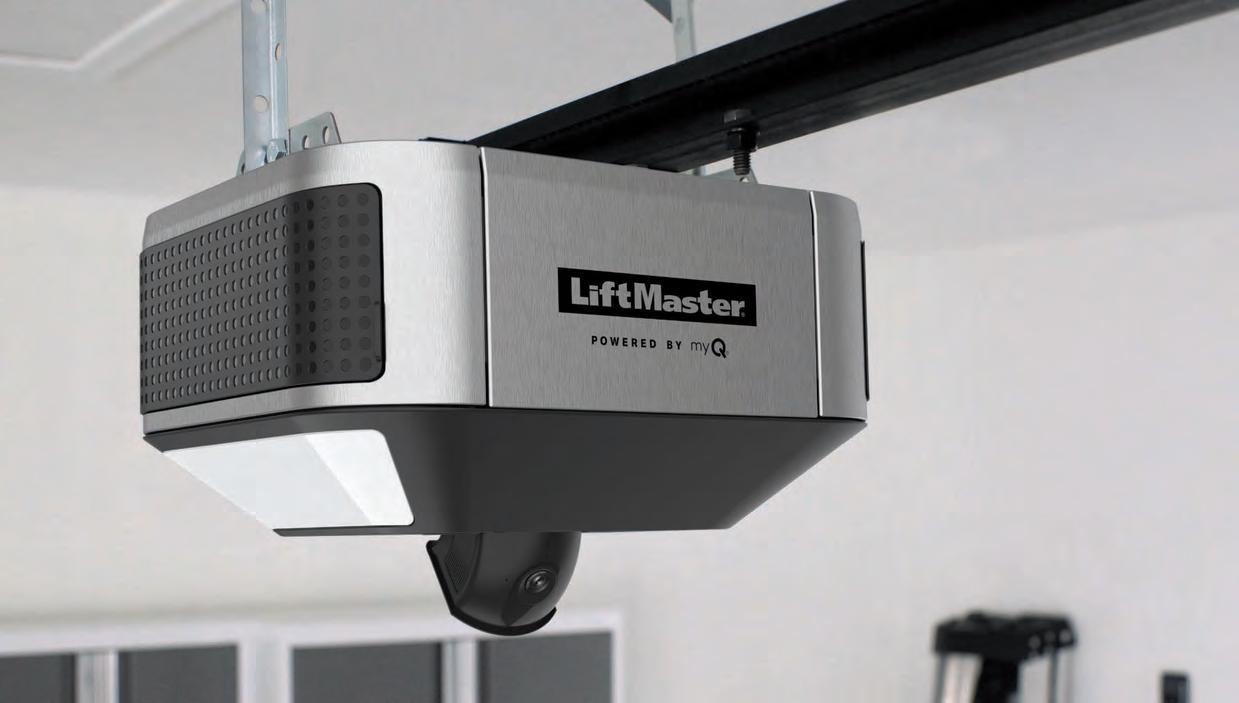
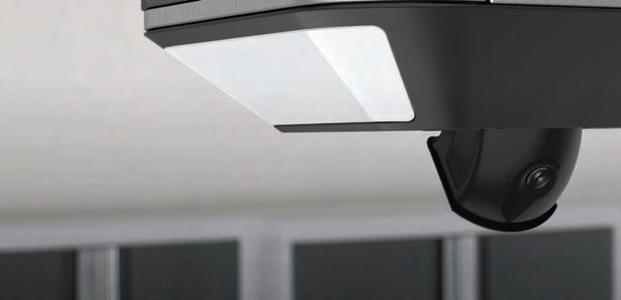


Do


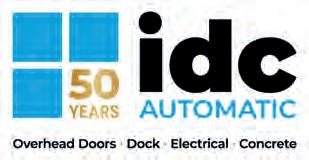
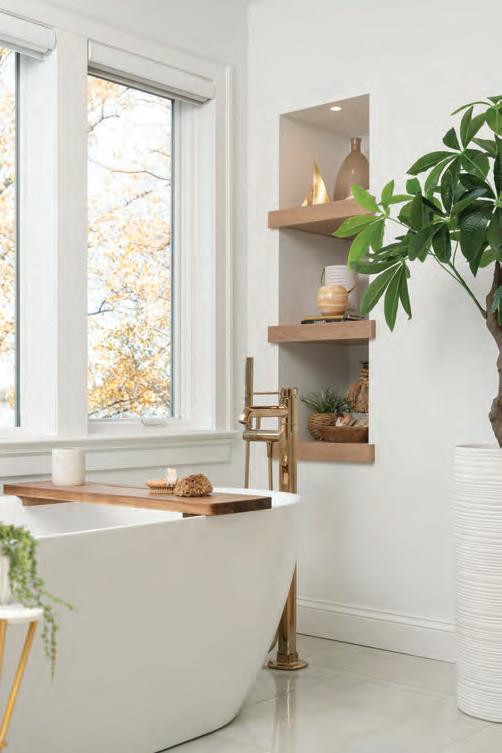
• Personalized Details: Statement backsplashes, custom hoods, and bold color choices are becoming more common than a seen-itbefore copy of what’s popular.
• Hidden Storage & Charging Stations: Maximizing functionality with built-in solutions.
• Smart Appliances & Touchless Tech: Enhancing convenience while maintaining aesthetic appeal.
• Overuse of Open Shelving: Many homeowners now prefer closed storage for a cleaner, less cluttered look.
• Subway Tiles with Black Grout: This once-popular combination is being replaced with more unique, textured tile choices.
• Overly Minimalist Kitchens: While simplicity is still valued, sterile, all-
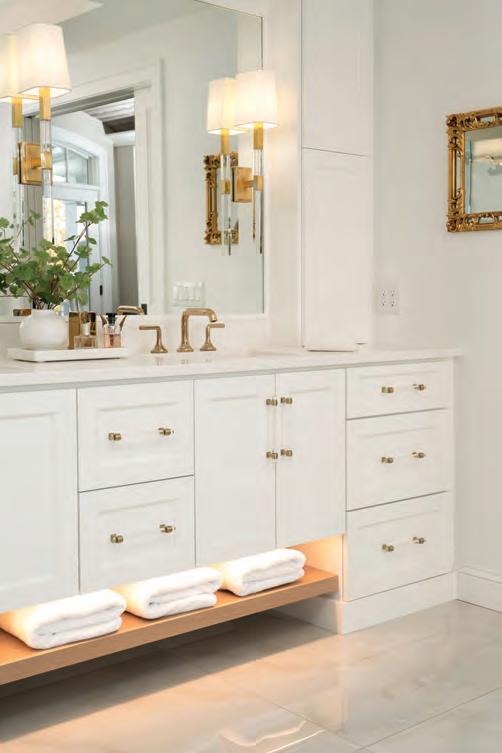
white kitchens are being replaced with warmer, more inviting designs.
For designers, builders, and industry professionals looking to stay ahead of the curve, here are the main lessons from NKBA and the panel discussion:
• Educate Your Clients: Help homeowners understand the difference between passing trends and lasting investments. Identify their top goals — like ease of use, quality of life, or resale value — and offer guidance on where they should spend versus where they can save.
• Prioritize Functionality: A beautiful design must also work well for daily life. Smart storage, lighting, and tech integration are just as crucial as aesthetics.
• Balance Trend and Timelessness: Encourage clients to incorporate trendy elements in flexible ways while keeping foundational pieces classic.
• Sustainability Sells: Energy efficiency, eco-friendly materials, and wellness-focused design are not just good for the environment — they’re top priorities for today’s buyers.
• Personalization is Key: The cookiecutter approach is fading. Offering customization options will help clients feel their space is uniquely theirs.
As kitchen and bath trends continue to evolve, the most successful designs will be those that seamlessly merge beauty, function, and personalization. By staying informed and adaptable, industry professionals can create spaces that not only meet current demands but also stand the test of time.



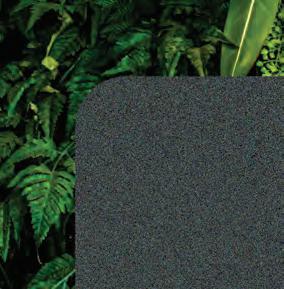





















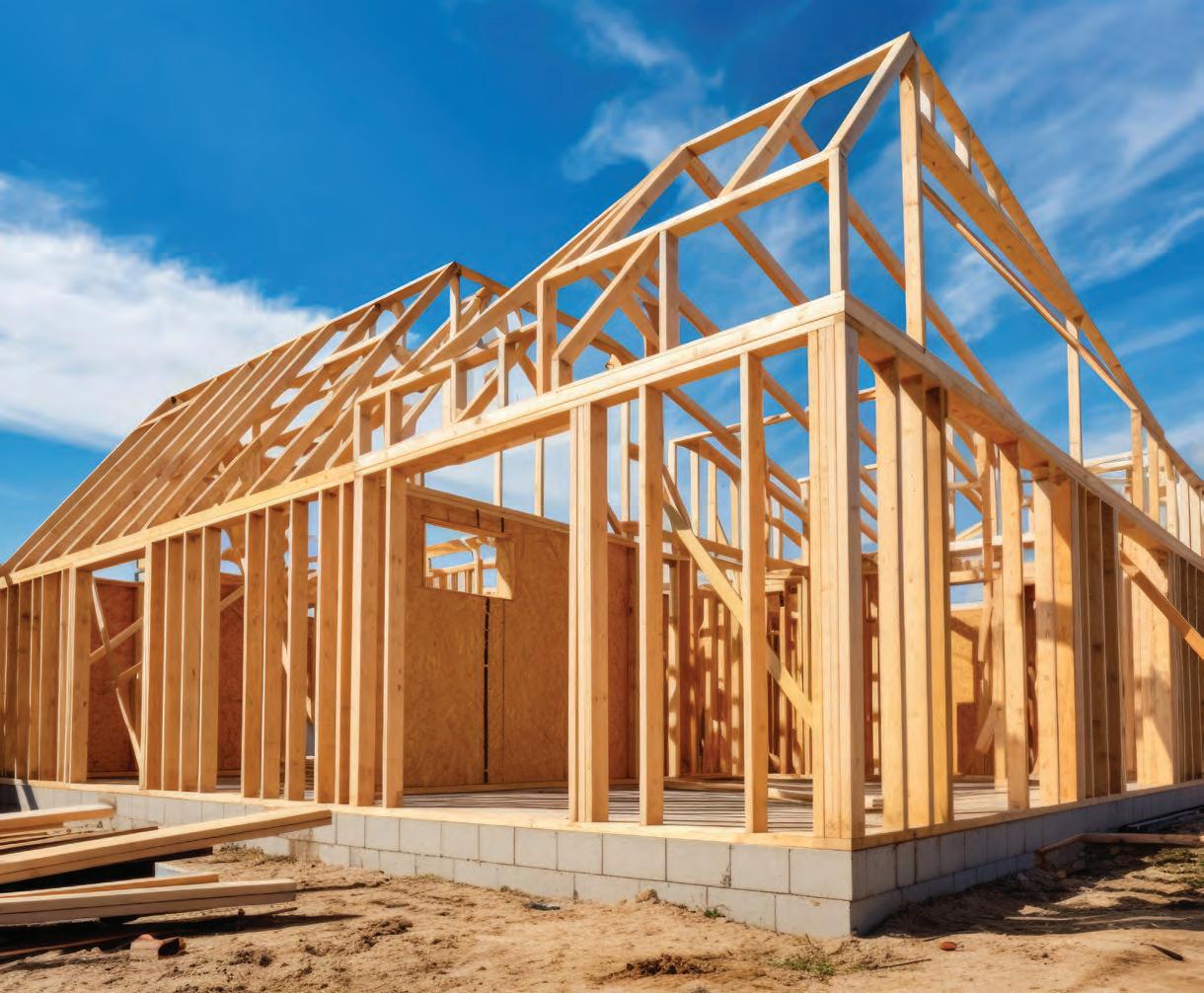


Hats off to Minnesota builders for their outstanding efforts to save energy and money during the construction of new homes.
According to the Residential Energy Services Network (RESNET), Minnesota boasts one of the lowest average Home Energy Rating System (HERS) index scores among states that tested over 4,000 homes in 2023. Like the miles per gallon in a car, a lower HERS index score indicates greater energy efficiency. With 7,727 homes tested in Minnesota in 2023, the state’s average HERS index score was 49. For comparison, the U.S. Department of Energy sets a typical resale home at a HERS index of 130 and a standard new home at 100.
The state’s average HERS score of 49 translates to homes being 81% more energy efficient than the average existing home.
Building a home to a higher standard of efficiency includes using improved insulation, air sealing, proper weather barriers, optimal window placement and design, advanced framing techniques, moisture control and considering the local climate to select appropriate materials. It all works together to minimize heat loss and gain, air leakage, and thermal bridging, ultimately reducing energy consumption in the home.
Minnesota’s Green Path program, created by Housing First Minnesota in 2011, is the state’s leading energy efficiency and green building program for residential construction. Since 2011, Green Path has provided Home Performance Reports and HERS scores for over 43,000 third-party tested homes.
Xcel Energy collaborates with Green Path and builders statewide to educate and encourage them to incorporate energy efficiency building practices through a variety of builder trainings.
“These builders are willing to go the extra mile to build energy efficient homes, and we want to encourage others to get involved. We partner with the Energy and Environmental Building Alliance to provide subsidized training that shows builders how to achieve Zero Energy Ready or ENERGY STAR NextGen status,” explained Matt Bober, Xcel Energy Efficient New Home Construction program manager.
Currently, 55 Minnesota builders are committed to testing at least 75% of their newly built homes annually. They also attend professional development events throughout the year.
Why build energy efficiency into the home? Here are a few of the potential benefits:
• Reducing energy costs.
• Fewer maintenance concerns.
• More comfortable and quieter home.
• Increased resale value.
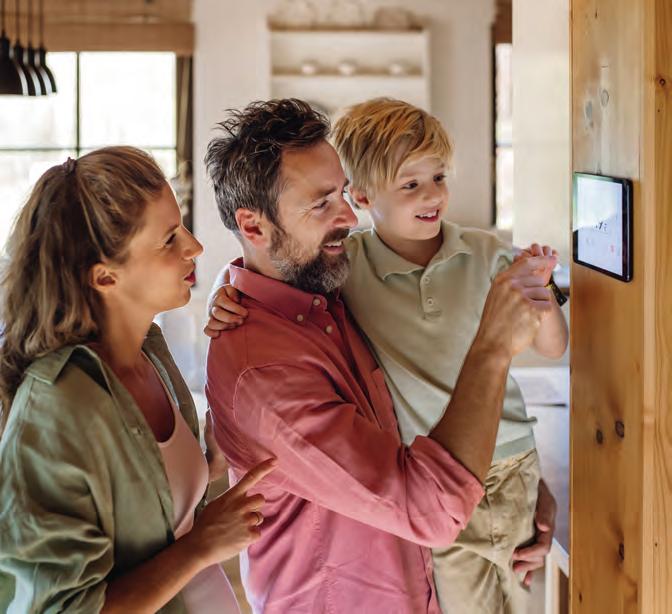
This year is set to be the most impactful year for the Housing First Minnesota Foundation to date! With five projects in progress or on the horizon, the Foundation is embarking on making its most profound and significant impact in its 30-year history.
The Housing First Minnesota Foundation is a mission-driven organization that has a legacy of building and renovating dignified housing for those experiencing homelessness or at-risk of becoming homeless. Our focus is on partnerships that lead community build projects for vulnerable individuals, families, and veterans who are at risk of or experiencing homelessness. These community build projects are a unique, collaborative model connecting builders, remodelers, and their trade partners in the building industry with nonprofit organizations in need of new or renovated housing solutions. Together, we can work to end homelessness in Minnesota!
Bravo Zulu House is a pioneering sober living environment specifically for military veterans with PTSD and addiction located in Winnebago, Minnesota. Their mission aims to establish a tranquil rural sanctuary for veterans striving to overcome addiction, offering more than just shelter. This is the first project
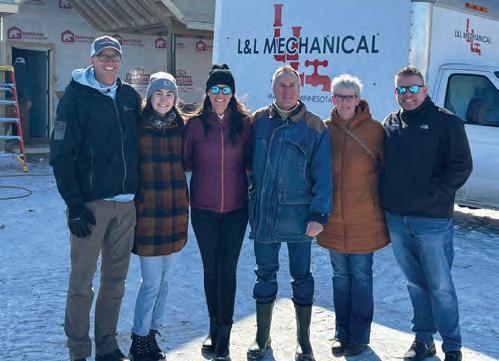
for the Housing First Minnesota Foundation outside of the Twin Cities metro. The Bravo Zulu build project broke ground in fall 2024 and has already made significant progress. Once completed veterans at Bravo Zulu House will have canine therapy, supportive services, and help operate a hydroponic farm as they heal and recover from addiction and PTSD.
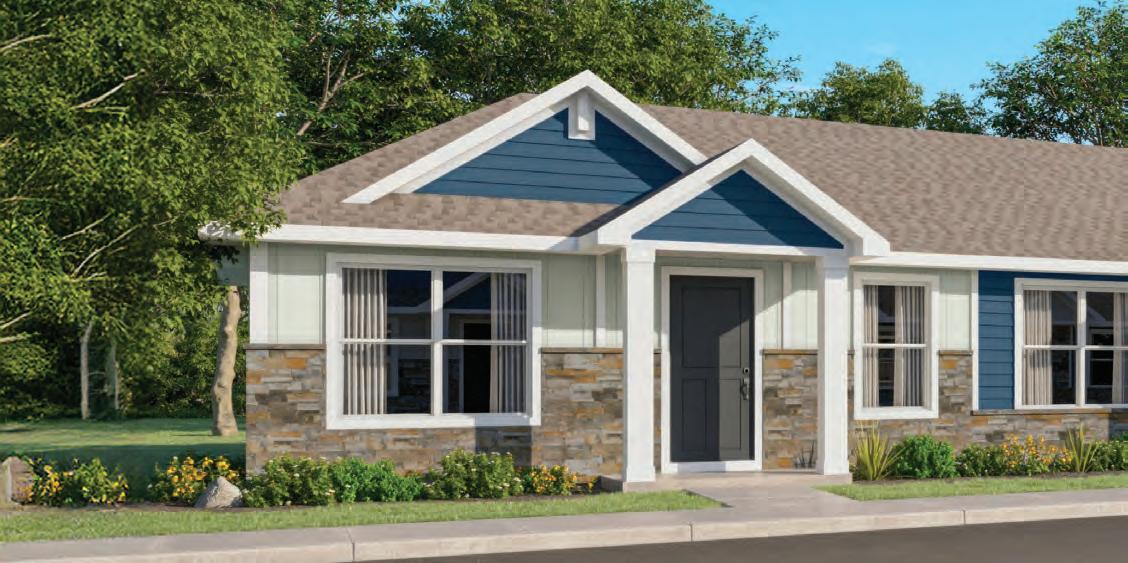
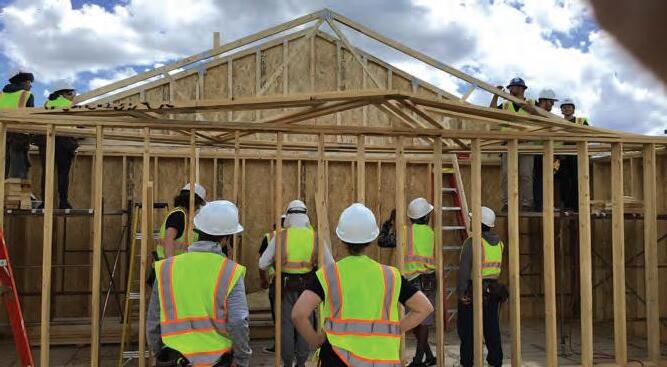
Since early 2024, the Foundation has been part of a project that has united our community like never before. Housing First Minnesota association members, Foundation supporters, and the Construction Trades program at Spring Lake Park High School, have all come together to support the nonprofit organization, Elevate Hope House. Elevate Hope House serves young, single mothers and their children in Anoka County, who need safe and stable housing. Through this partnership, the Foundation has constructed a three-bedroom home that will serve as transitional housing for single mothers and their children in crisis.
The Minnesota Assistance Council for Veterans (MACV) provides transitional housing for veterans and their families who are at risk of or are experiencing homelessness. In 2025, the Foundation is constructing its 15th Housing for Heroes home in St. Paul. A $20,000 grant from the Hugh J. Andersen Foundation has been instrumental in completing this project.
The Foundation is also embarking on its largest project to date with build partner Lennar and Lennar Foundation. The firstever multi-unit complex for veterans and
To make a gift or donation, please visit HousingFirstMNFoundation.org or scan the QR code:









their families — Veteran Village in Eagan, Minnesota — is scheduled to break ground in spring 2025, with the first homes being move-in ready by fall 2025. Upon completion, this Veteran Village will be able to house upwards of 35 veterans and their family members. The construction of Veteran Village will allow MACV to declare the effective end of veteran homelessness in Minnesota!
All these projects are ever evolving. Get involved, learn more, and show your support for these projects as we make our largest impact as a Foundation in 2025!
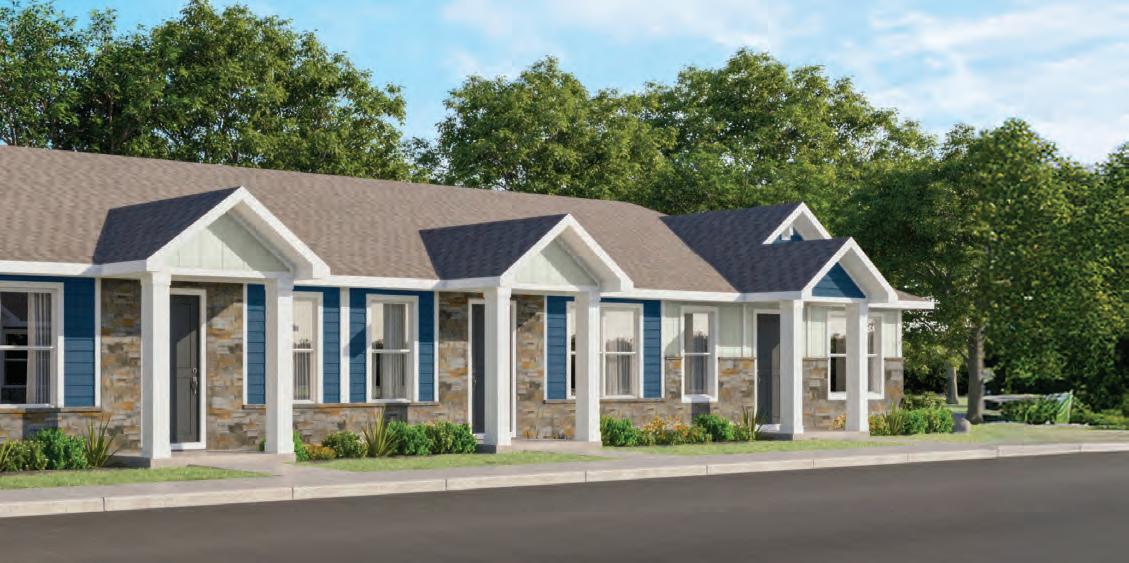

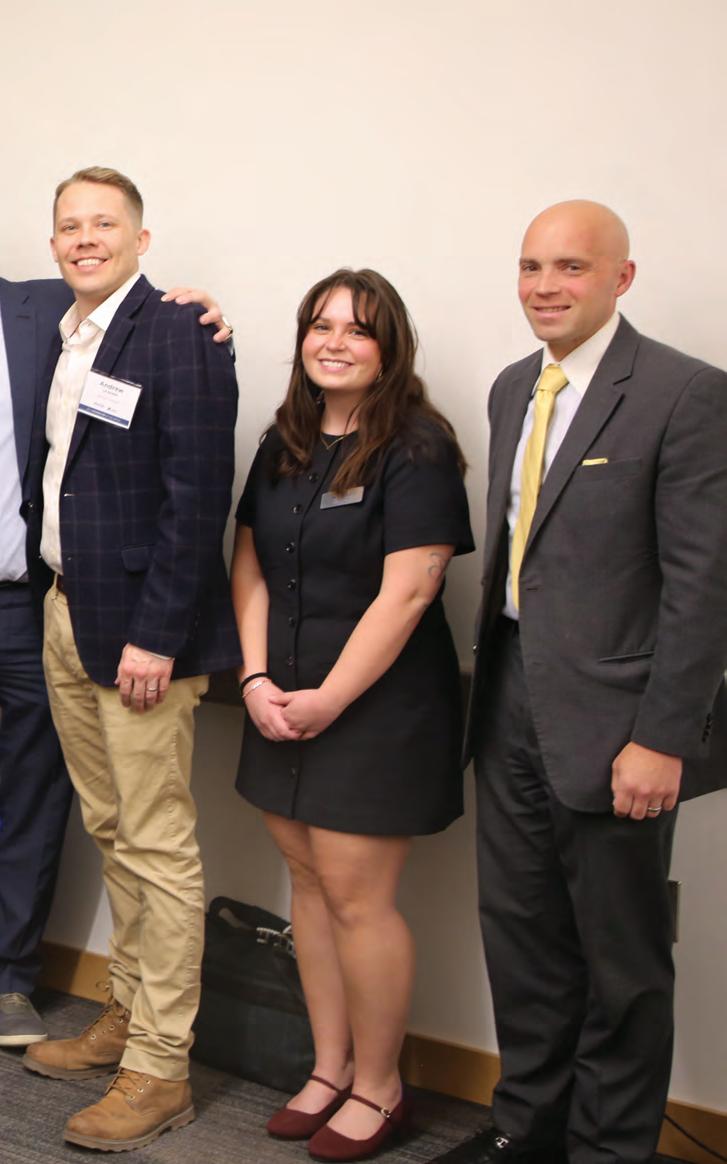























At Housing First Minnesota, advocacy plays a crucial role in shaping the policies that impact our industry. Some of our most engaged members share what inspired them to get involved, the challenges they’ve faced, and why they encourage others to join the cause.
For Rebecca Remick of City Homes, advocacy began with committee participation.
“As I became more engaged, I saw firsthand the impact of Housing First Minnesota’s advocacy efforts. At the same time, I was dealing with frustrating challenges at the local government level — navigating building variances and development approvals that often felt unnecessarily complex,” Remick says. “I quickly realized that many of these issues weren’t isolated but part of a larger, systemic problem that needed to be addressed at the state level. Housing First was leading that charge at the Capitol, and I knew I wanted to be part of the solution.”
Cardinal Homebuilders’ Tony Weiner’s motivation stemmed from a desire to engage with the industry while also making meaningful change.





















“I wanted to get more involved with the industry as a whole and meet others in the building community,” he says. “I also had a passion for politics and saw that changes could be made in our industry.”
For Andrew LeJeune of GlassArt Design, advocacy became personal during the pandemic.
“I’ve always felt a commitment to my community,” shares LeJeune. “When COVID underscored the critical role of state government, I saw that simple criticism wasn’t enough. I wanted to contribute directly instead of just talking.”
Many advocates can point to a specific issue that spurred them into action. For Weiner, it was the sprinkler mandate.
“We had to start building homes with a product that didn’t have data behind it that proved its worth. I saw that Housing First (then BATC) was able to take charge and bring about change on that issue. I think I got involved with the association shortly after that,” Weiner shares.
“COVID served as a clear wake-up call, revealing how essential state leadership is and urging me to step into the role of an active participant,” adds LeJune.
Being involved in advocacy has had a profound impact on both personal and professional growth.
“Engaging in advocacy has given me a broader understanding of how these policies are created and the importance of having a voice at the table to protect and advance our industry’s interests,” explains Remick. “Many of the frustrations I’ve encountered at the local level — such as building variances and development hurdles — are often part of larger, systemic issues. Through Housing First’s advocacy efforts, I’ve learned how addressing these concerns at the state level can create meaningful, industrywide change.”
Weiner echoes this sentiment, adding, “I have kept so up to date on changes in our industry. I’ve been able to see things coming that I might not otherwise have known about, new rules or regulations, and get a head start on being prepared. It’s also given me great networking opportunities to talk to others about helping the association either promote or push back on legislation.”

The more involved you get, the clearer it becomes how vital advocacy is for the future of housing in Minnesota.
REBECCA REMICK
For those considering advocacy but unsure where to start, Remick advises, “My advice to anyone interested in getting involved with advocacy at Housing First Minnesota is simple: start by showing up. Join a committee, attend events, and engage with other members who are already active in advocacy. The more involved you get, the clearer it becomes how vital advocacy is for the future of housing in Minnesota. And you don’t have to do it alone — Housing First provides the support, resources, and community to help you make an impact.”
LeJune suggests beginning with the annual event that brings members together with legislators for face-to-face discussions on the way
policy impacts your business: Housing Day at the Capitol.
“It’s a great opportunity to meet state representatives face to face and discuss the issues that matter to you. Start with a conversation, and let your involvement grow naturally,” he explains.
Advocacy is a powerful tool in shaping the future of homebuilding in Minnesota. As these members have demonstrated, taking that first step can lead to meaningful change — not just for the industry, but for the communities we serve. Whether you’re looking to navigate regulatory challenges, stay informed on legislative changes, or build a stronger network, Housing First Minnesota provides the resources and platform to make a difference.
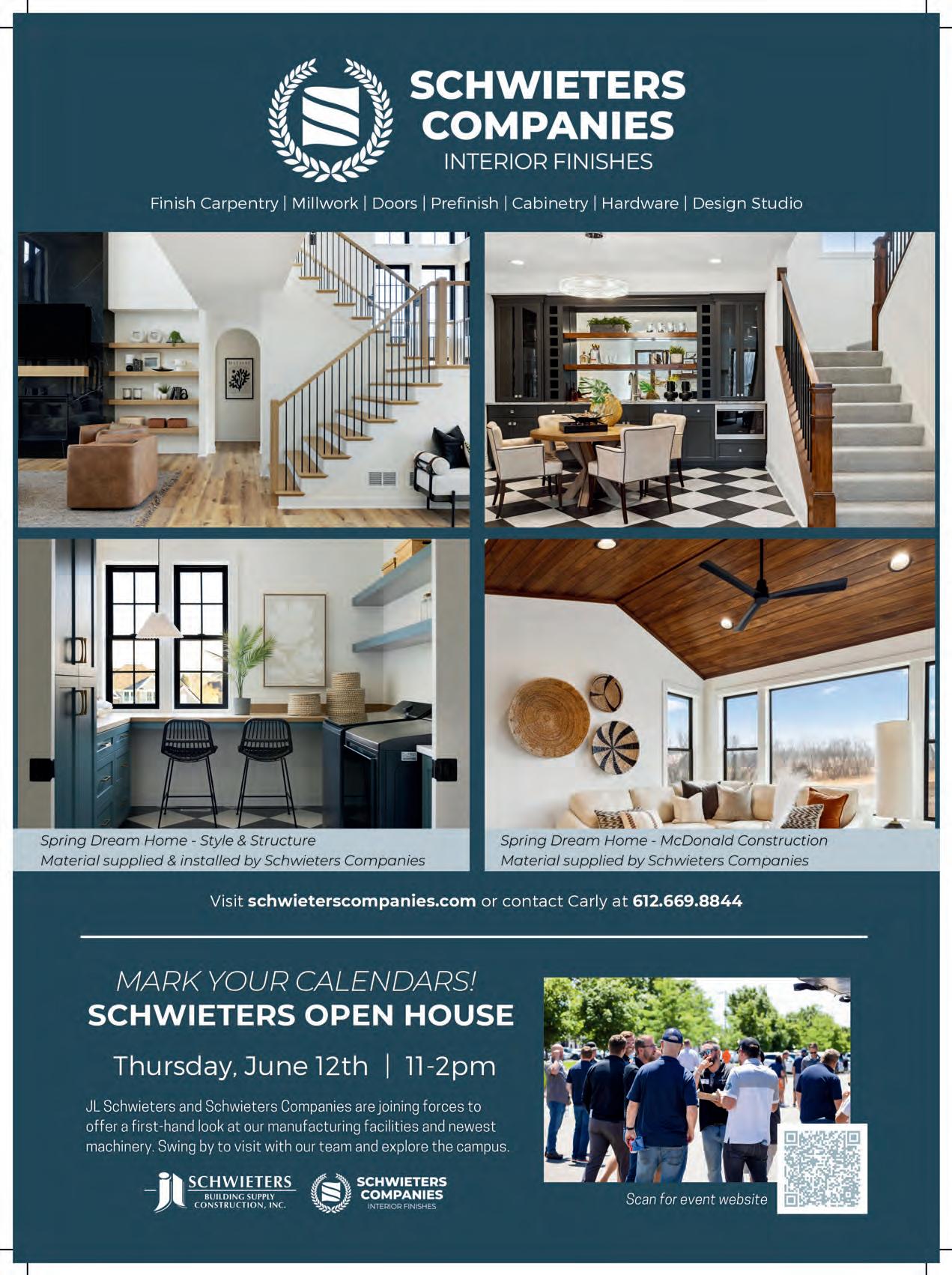

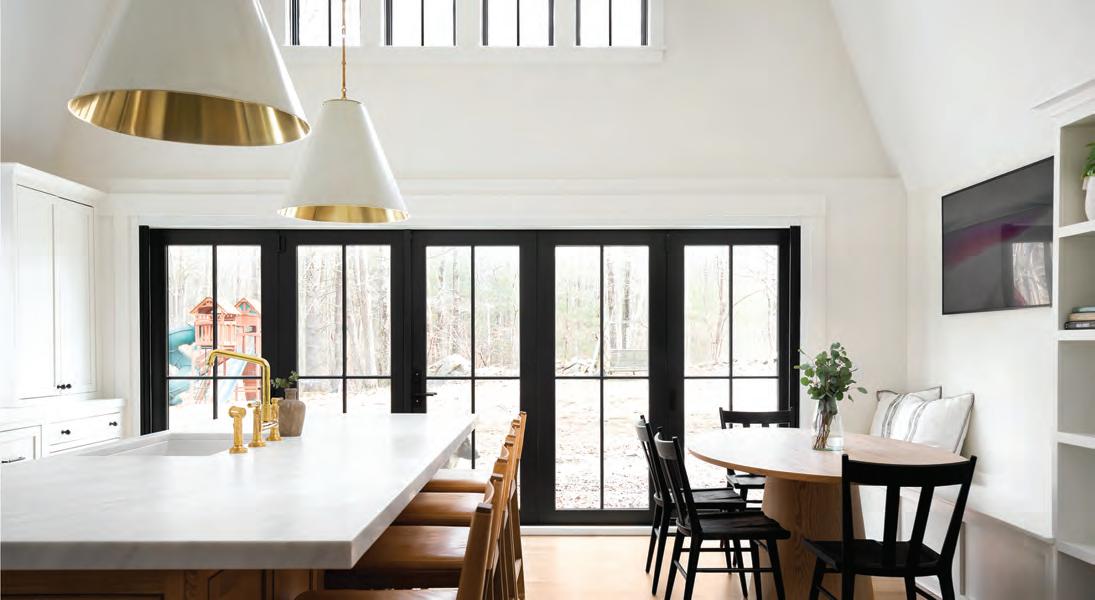
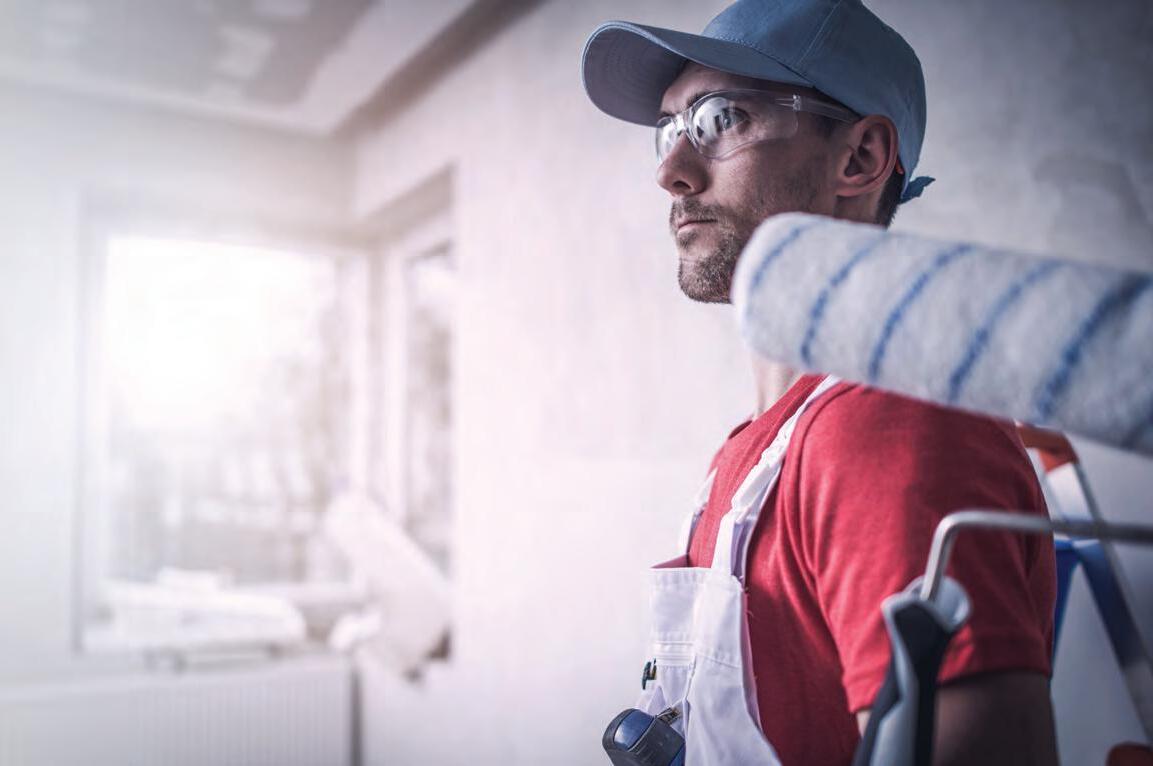
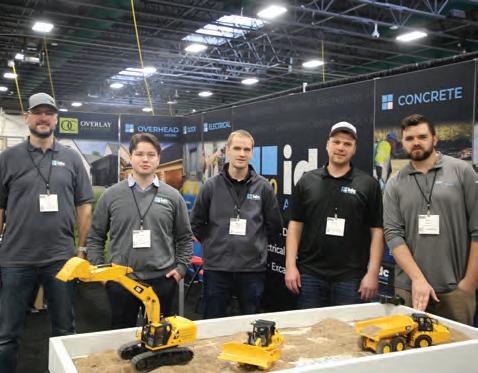

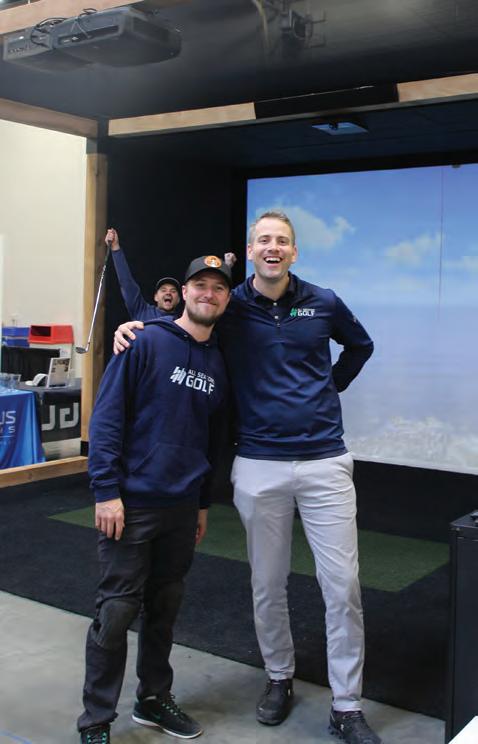


Our annual trade show was a buzz-worthy gathering of 850+ industry professionals discovering innovative products, growing strategic partnerships, and gaining valuable business insights.
february 13, 2025
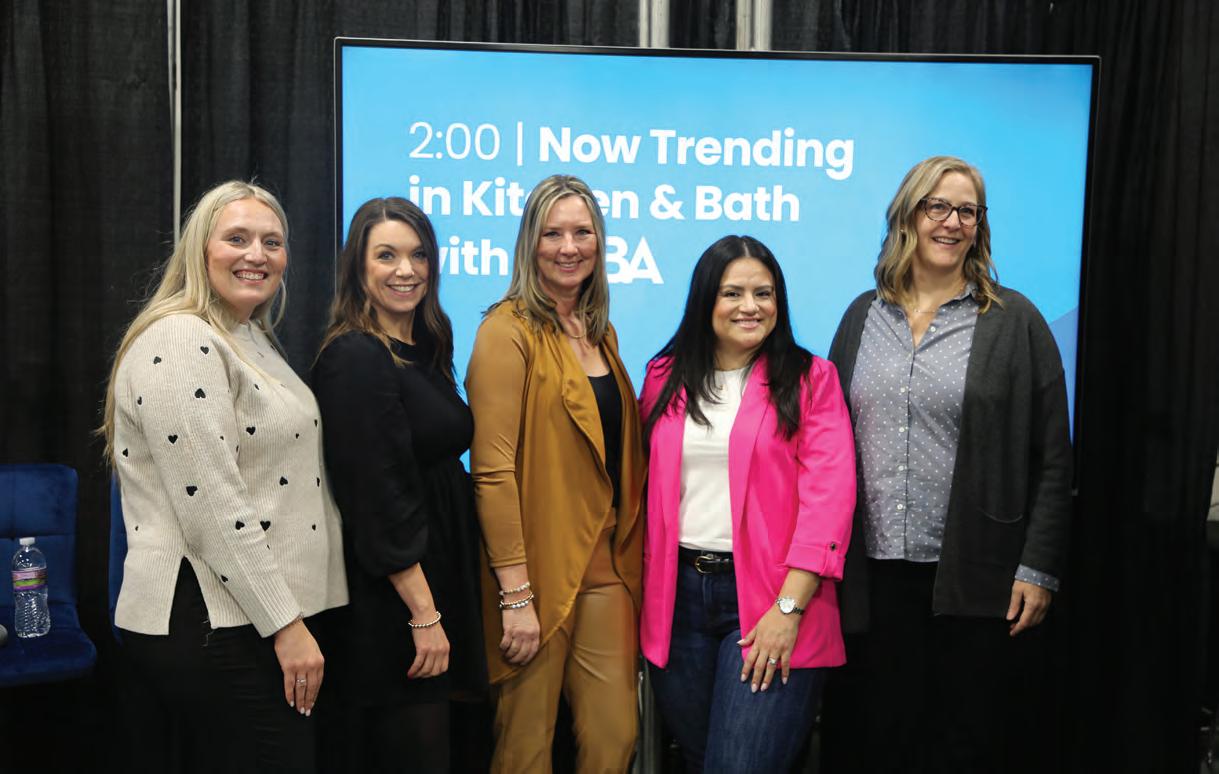

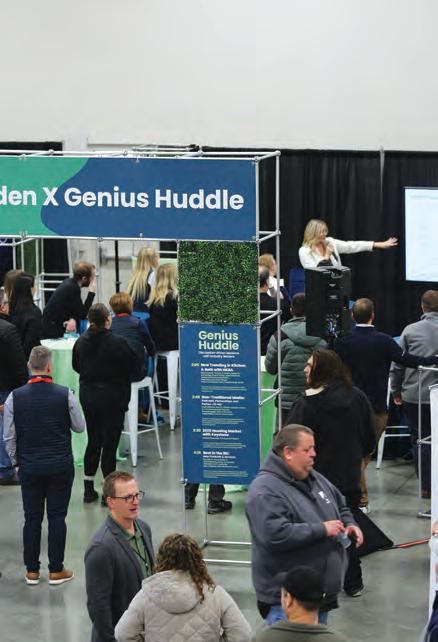
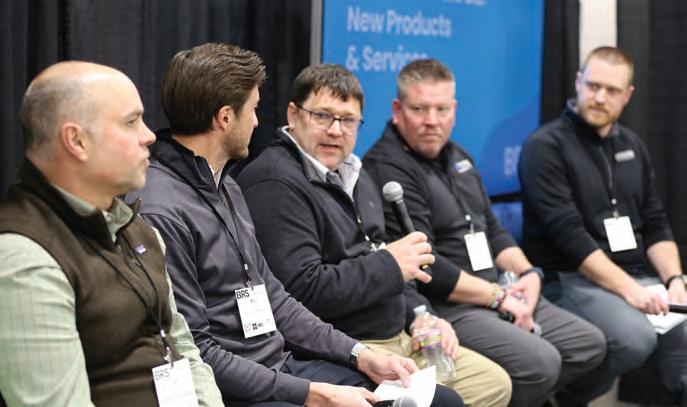

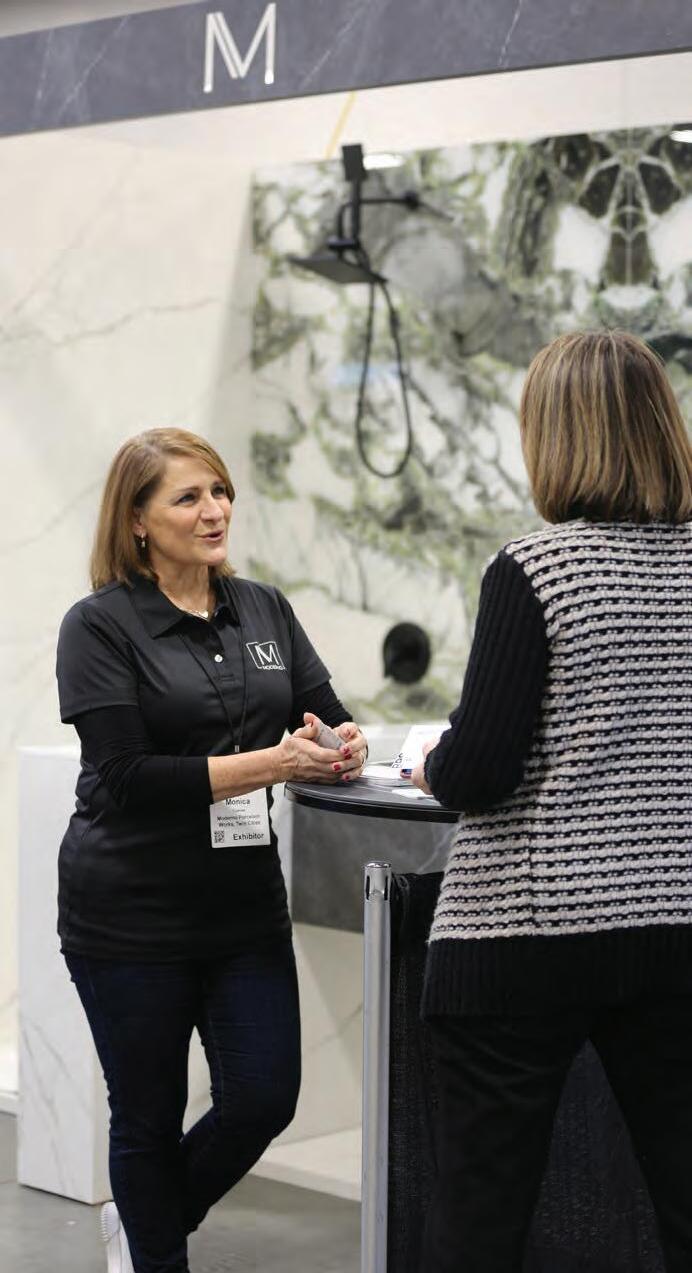

PRESENTING SPONSORS


SHOW SPONSORS

WORKFORCE SPONSOR
GOLF SIMULATOR SPONSORS

BAG SPONSOR
HEADSHOT STATION SPONSOR
Arrow Building Center
BEER GARDEN SPONSORS
California Closets
Cityscape Painting Contractors, Inc.
LP Building Solutions
Twin Cities Closet Company
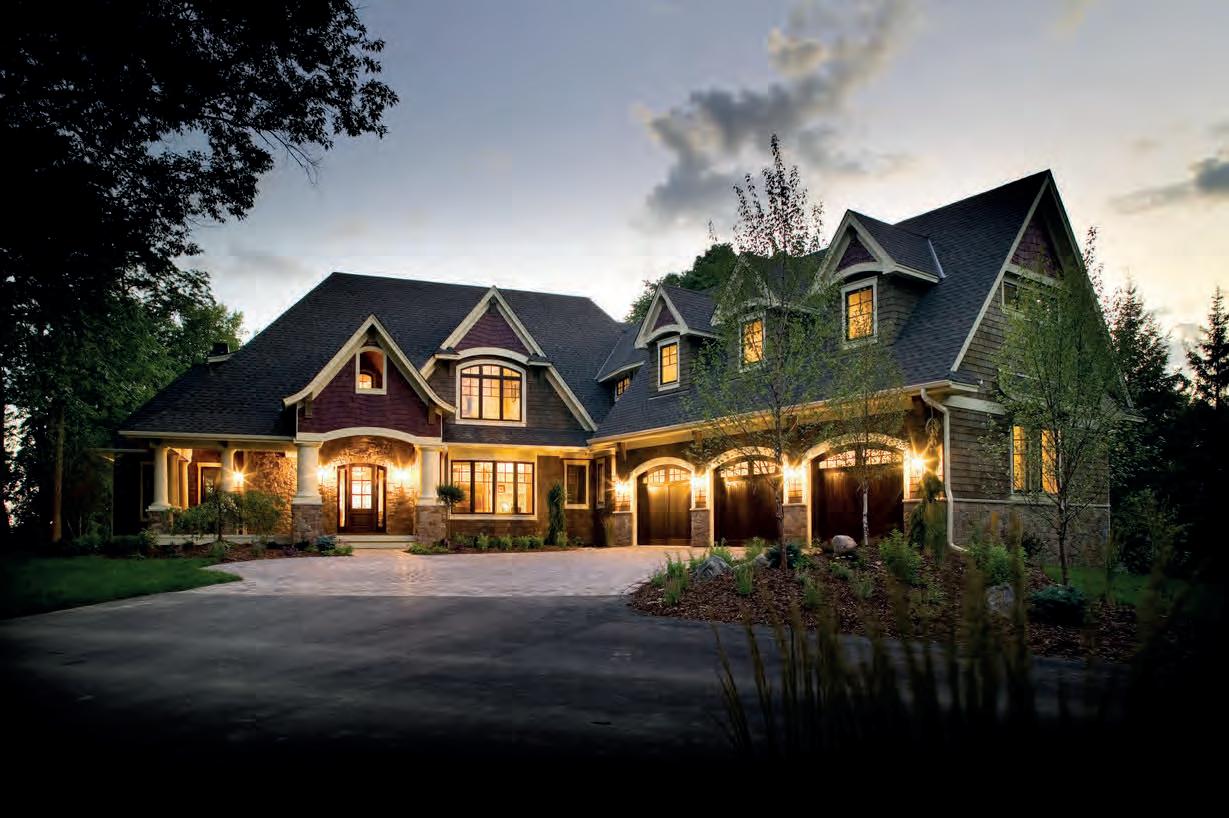

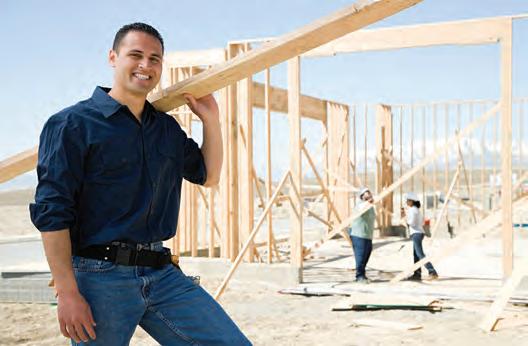




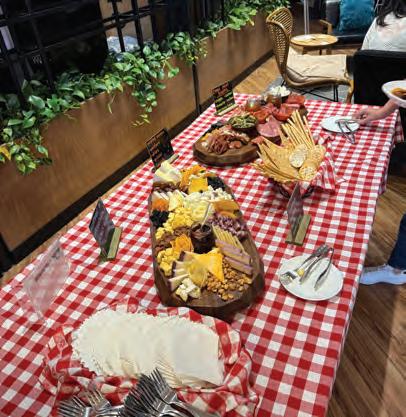
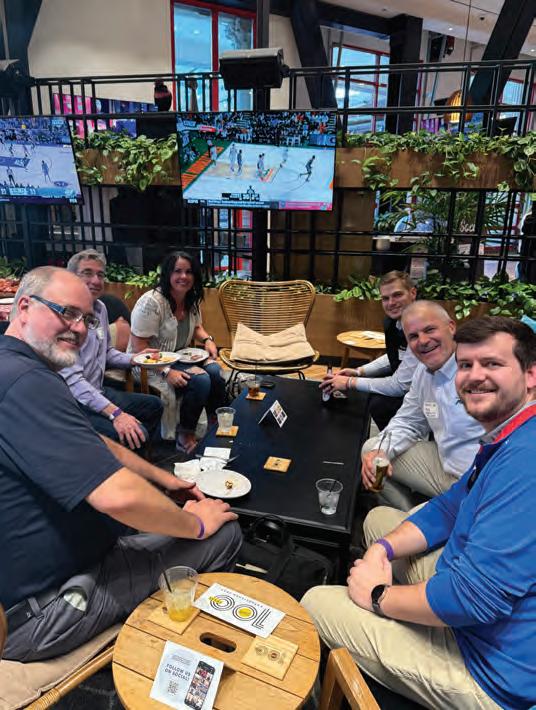
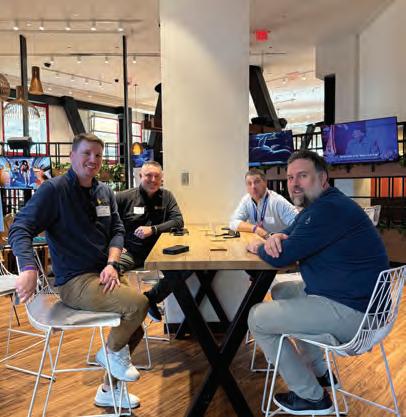
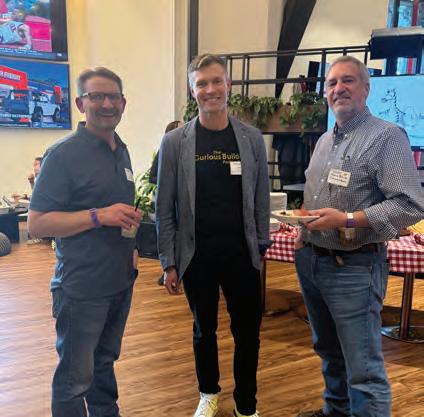
PRESENTING SPONSOR
Connecting industry members across state lines! We had a great turnout for our Housing First Minnesota happy hour during the International Builders Show in Las Vegas.
February 25, 2025


With an empowering rally, informative panel, and face-to-face meetings with legislators, the industry stepped up to advocate for change at the Capitol this March.

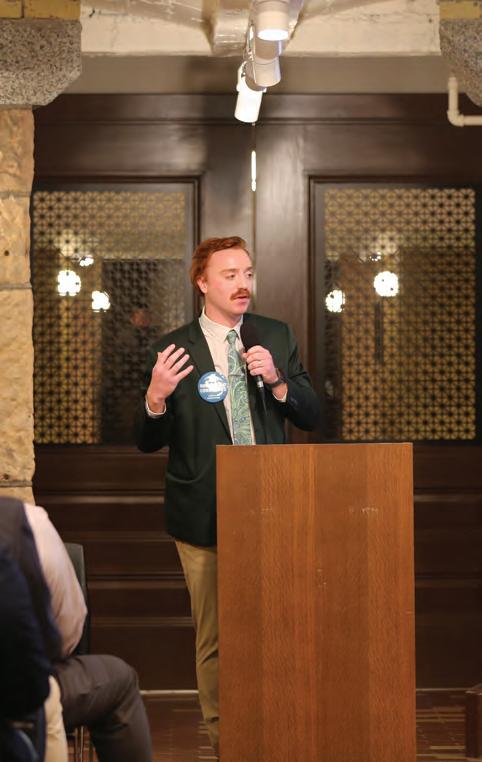

March 3, 2025
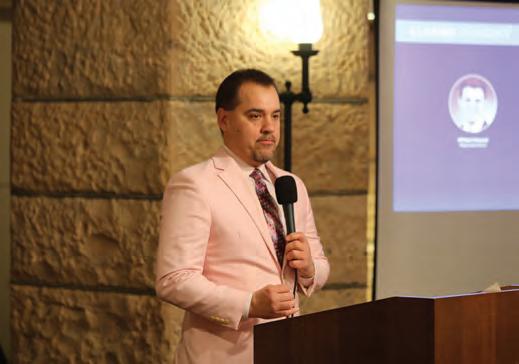
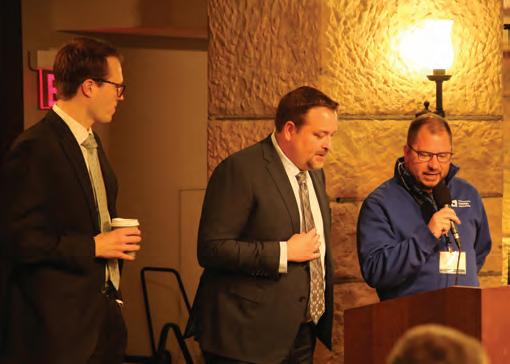
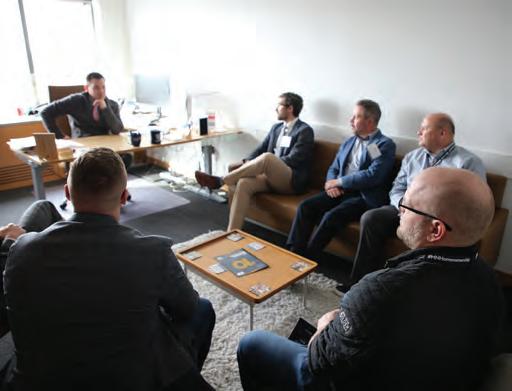

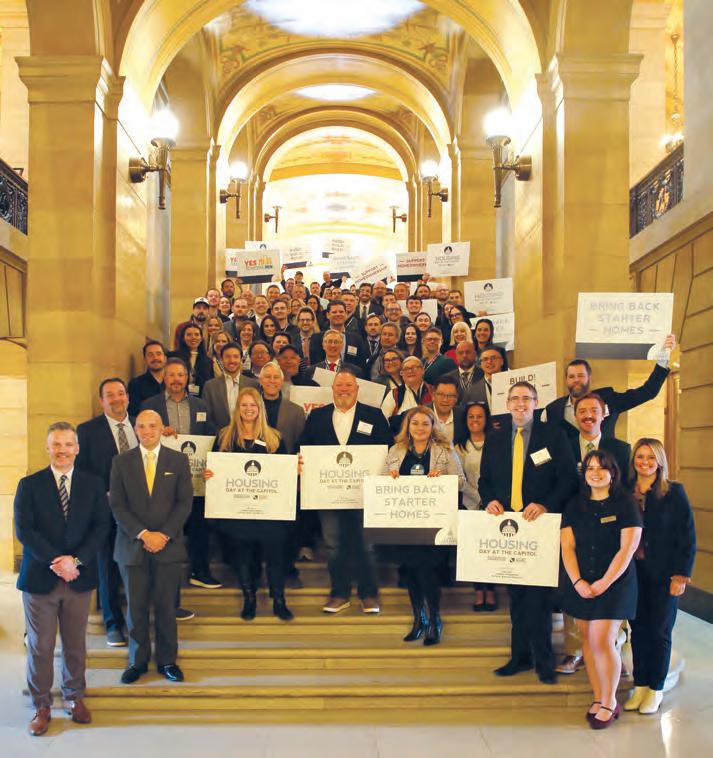
CAPITOL SPONSORS
ADVOCATE SPONSORS
All, Inc.
Lyman Companies
Scherer Bros. Lumber Co.
BREAKFAST SPONSOR
LP Building Solutions
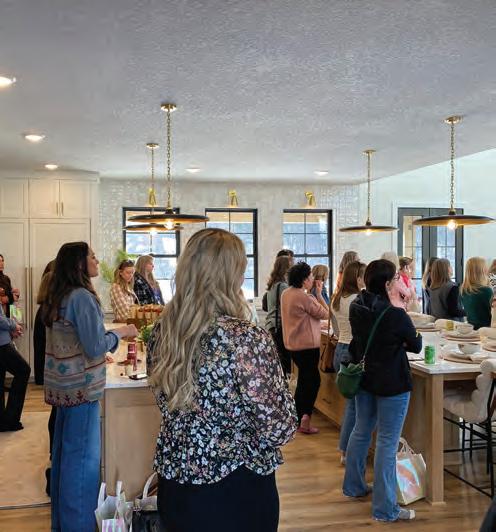
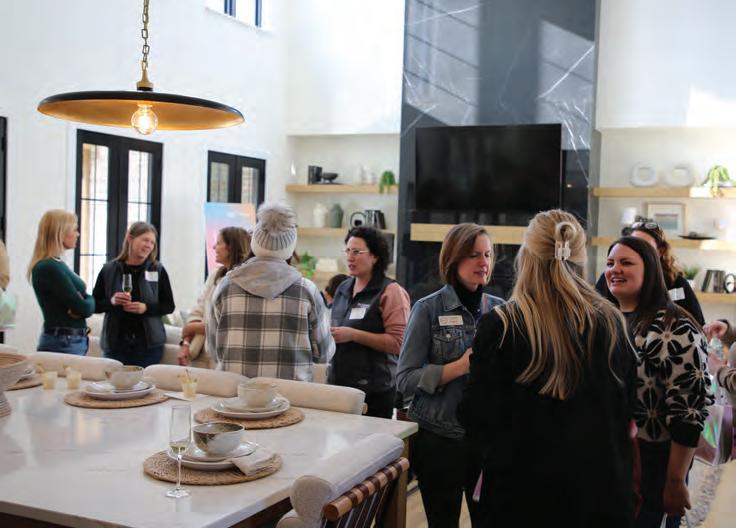

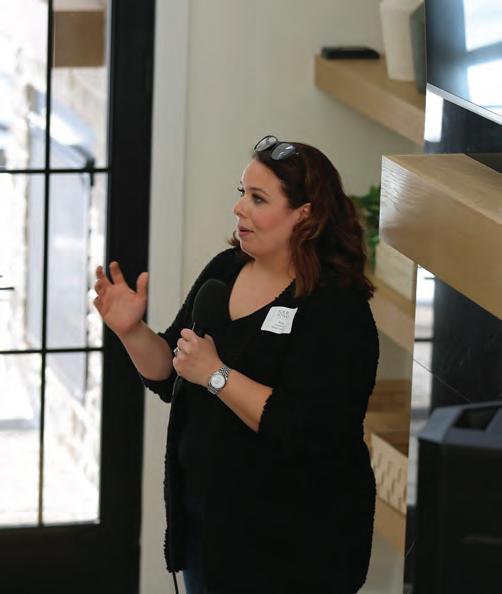
A celebration of Women in Construction Week and International Women’s Day, the sold-out Tour & Toast event allowed the industry to raise a glass to the inspiring women making waves in the construction industry!
March 6, 2025
SPONSORS

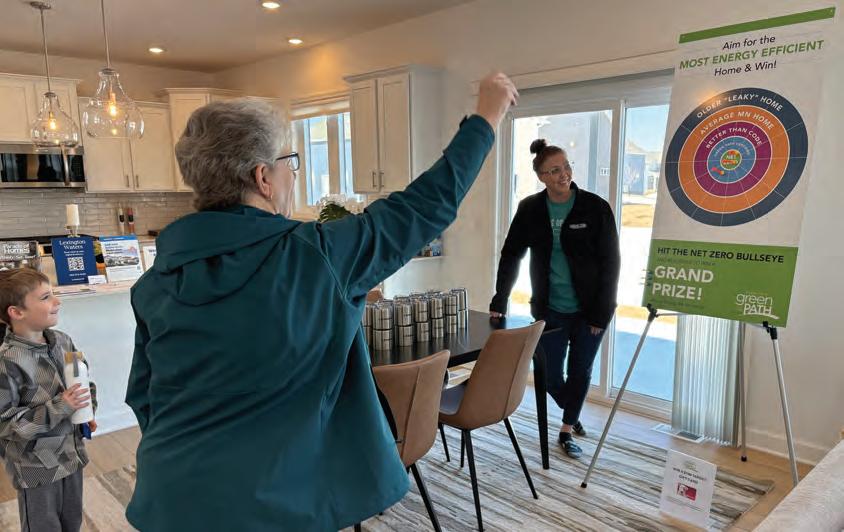
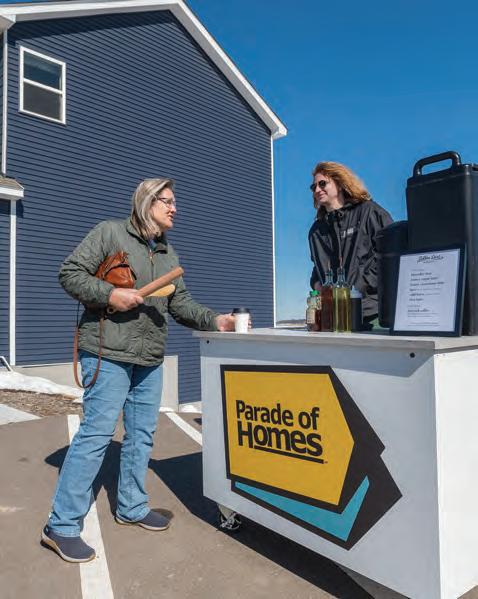
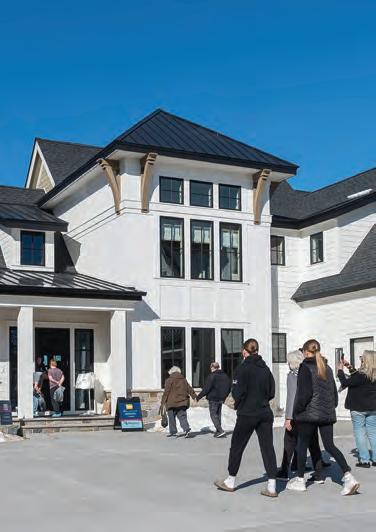
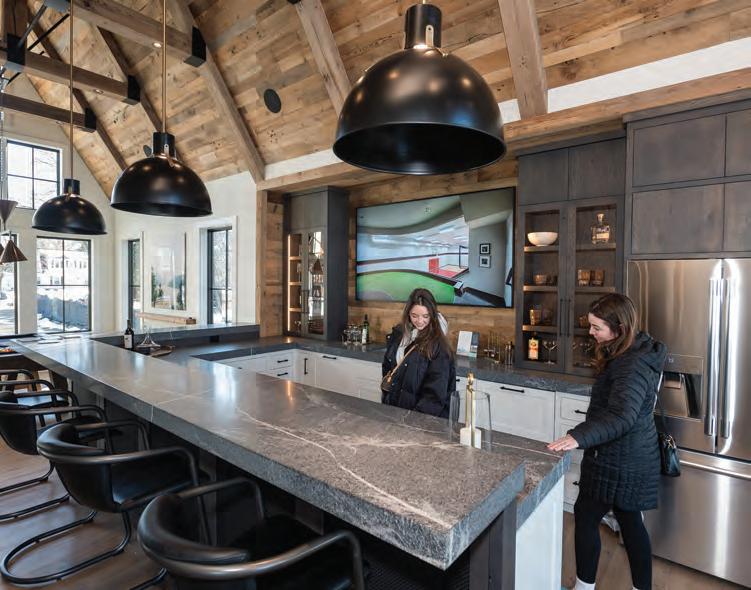
Opening the doors to over 360 new construction homes and 32 remodels across the metro.
March 7-April 6, 2025
PARADE OF HOMESSM PRESENTING SPONSORS
REMODELERS SHOWCASE® PRESENTING SPONSOR
I can tell you that there is 100% appetite for bipartisan [housing] reform.
NICK ERICKSON
HOUSING FIRST MINNESOTA, ON FINANCE & COMMERCE’S BEYOND THE SKYLINE PODCAST
Underlying these challenges is one simple fact: Minnesota is not building enough homes — especially the kinds that Minnesotans are so desperate to find. We face a housing shortage of more than 100,000 homes across the state, which is leading to higher prices, fewer choices and myriad negative economic consequences — for families and for our state as a whole.
REP. SPENCER IGO, REP. MICHAEL HOWARD, SEN. JORDAN RASMUSSON AND SEN. LINDSEY PORT
OP-ED IN THE MINNESOTA STAR TRIBUNE
Stop that Zillow-scrolling — there’s a more satisfying way to get some serious house envy this weekend. Over 360 homes are opening their doors starting Friday for the Spring Parade of Homes, a biannual “open house” of new builds across the metro for potential homebuyers (or those looking for inspiration).
AXIOS
COVERAGE OF THE OPENING WEEKEND OF THE SPRING PARADE OF HOMES


HOUSING FIRST MINNESOTA IS MAKING HEADLINES.
DIG IN TO SOME OF THE RECENT COVERAGE OF OUR WORK AND MISSION WITHIN NEWS OUTLETS ACROSS THE STATE.
It’s a great opportunity for folks to get out and see what’s in the market. Maybe you are starting your homebuying journey or maybe you just want to get inspired – it’s a Pinterest board come to life.
KRISTEN CROSSMAN
HOUSING FIRST MINNESOTA, PARADE OF HOMES FEATURE ON KSTP

Higher mortgage rates had a disparate impact on housing construction in the Twin Cities metro during 2024, causing apartment construction to wither while homebuilding gained ground.
Last year, cities issued builders and developers 6,281 single-family permits, a 14% increase from 2023, according to a year-end report from Housing First Minnesota, the state’s largest trade group for builders.
JIM BUCHTA
THE MINNESOTA STAR TRIBUNE
A R Engh
Heating & Air Conditioning, Inc.
Andy Engh 320-286-2020
Aeroseal
Nick Budd 813-797-0137 aeroseal.com
Archi-pix
Alex Aaron 612-965-0135 archi-pix.com
Architechne, LLC
Jeff Cole 612-456-9105 architechne.net
Aurora One
Lighting
Kristin Reinitz 952-767-6710 auroraonelighting.com
Bassford Remele
Janet Nelson 612-333-3000 bassford.com
Blue Pencil Collective
Kasey Johnson 651-968-4487 bluepencilcollective.com
Brian Pankratz, CBRE
Brian Pankratz 612-839-1005
Castle Building & Remodeling, Inc.
Loren Schirber 612-789-8509 castlebri.com
Catani Cabinets
Dani Lynde 651-222-9224 catanicabinets.com
Chapman Homes, Inc.
Michael Chapman 612-961-0328 chapmanhomesinc.com
Dandelion Energy
Lynn Patzner 651-238-4789 dandelionenergy.com
Double Deuce
Distribution
Alex Speed 651-329-0329 doubledeucedist.com
DSP Homes, LLC
David Huber 952-641-9487 dorancompanies.com
Erskine Interiors
Tonya Sheeder 651-730-2021 erskineinteriors.com
Evergreen Construction Company, Inc.
Joe Hahs 651-755-0643 mnevergreen.com
Garage Doors Plus, LLC
Jamie Sibley 612-760-7551 garagedoorsplusllc.com
GoliathTech MN, LLC
Lisa Vieau 612-605-3233 goliathtechmn.com
Hewn Laurie Solie 612-963-8668
Insulation, Inc.
Jesse Moxness 612-525-4046 insulationinc.com
Landmark Metal Innovations
Daniel Trudeau 651-955-2752 lmi-mn.com
Landric
Associates LTD
Noah Bluesky 651-734-8400 landricltd.com
LGI Homes Minnesota, LLC Johnathan Welch 833-873-4728 lgihomes.com
Michael Paul Design Build
Michael Laumann 651-785-7719 mpdesignbuild.com






Minnota Builders, LLC
Erdogan Akguc 612-338-6398
Paperboy
Marketing
Tracy Kelly 507-273-2609 paperboymarketing.com
Renova Homes, LLC
Daniel Payne 651-300-0731
SpTech
Helical Piers
Michelle Byers 952-405-0021 sptechmn.com
T Buck, Inc.
Jennifer Smith 715-338-3608 tbuckproperties.com
Terminator Group, LLC Wayne Srsen 952-292-5677 terminatorclip.com
Unique Wood Floors
Winston Zheng 952-994-9696 uniquewoodfloor.com
Weather Shield Windows & Doors John Palecek 800-222-2995 weathershield.com
Wildwood Kitchens and Baths Janel Swanson 651-503-0504 wildwoodkitchens andbaths.com
Your Home Improvement Company Nakia Stephens 612-238-1762 yourhome improvementco.com












EXCLUSIVE MEMBER OFFERINGS & DISCOUNTS
Housing First Minnesota has brought together an array of members-only benefits that positively impact your bottom line. We seek companies that thoroughly understand the building industry and provide products at rates generally not available to the public. Give these folks a chance to see what they can do for you.
VIEW MORE MEMBER DISCOUNTS AT HousingFirstMN.org/MemberOfferings






BUSINESS ESSENTIALS
• 1% of your purchase goes to Housing First Minnesota Foundation
• Competitive & customizable pricing
• Free next-day business delivery (on most items)
• Your account rep is an active Housing First Minnesota member
Olivia Monk
763-595-5340 (o) 651-756-0205 (c) omonk@orderbe.com
HOMESPHERE
Learn how you can join over 2,700 builders receiving incentives and rebates from building product manufacturers. Rebates often exceed the cost of membership and it’s easily manageable!
Melissa Wolf
331-431-7433 MWolf@HomeSphere.com
NATIONAL PURCHASING PARTNERS (NPP)
DISCOUNTS
• Airgas
• Cintas
• Projul
• Sherwin Williams
• Staples
• Verizon Business
• And MANY more!
NPP
800-810-3909
CustomerService@MyNPP.com


HOLIDAY STATIONSTORES
• Save 30 cents per gallon for the first 90 days (new applicants only)
• Save 6 cents per gallon all the time
• $2 off a car wash at any participating Holiday
Nick Carow
1-951-830-8889 | nick.carow@circlek.com

ASSOCIATION HEALTH PLAN
Our Association Health Plan (AHP) helps small businesses in the residential construction market provide insurance to their employees. Fully insured by Blue Cross Blue Shield and managed by North Risk Partners, the AHP is a great way to recruit and retain employees with an average savings of 7-10% for participating companies.
Janice Meyer
651-697-7566 | Janice@HousingFirstMN.org


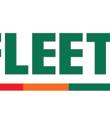

SPEEDWAY & 7-ELEVEN
• Business fuel card program
• Fuel rebates up to 5 cents off per gallon
• Mobile management tools
Avani Mehta
630-698-0118 | Avani.Mehta@WexInc.com
JEFF BELZER’S COMMERCIAL
Members receive a $750 discount off any commercial new vehicle purchased from Jeff Belzer’s. Plus, enjoy a free service loaner, free pick-up/drop-off for service work, and express commercial service.
Adam Engdahl 651-633-3500 AEngdahl@JeffBelzer.com
We specialize in:
• Rough Cut Mowing
• Silt Fence Installation
• Hydro Seeding
• Seed and Mulch
• Tree and Safety Fence
• Inlet Protection
• Erosion Blanket
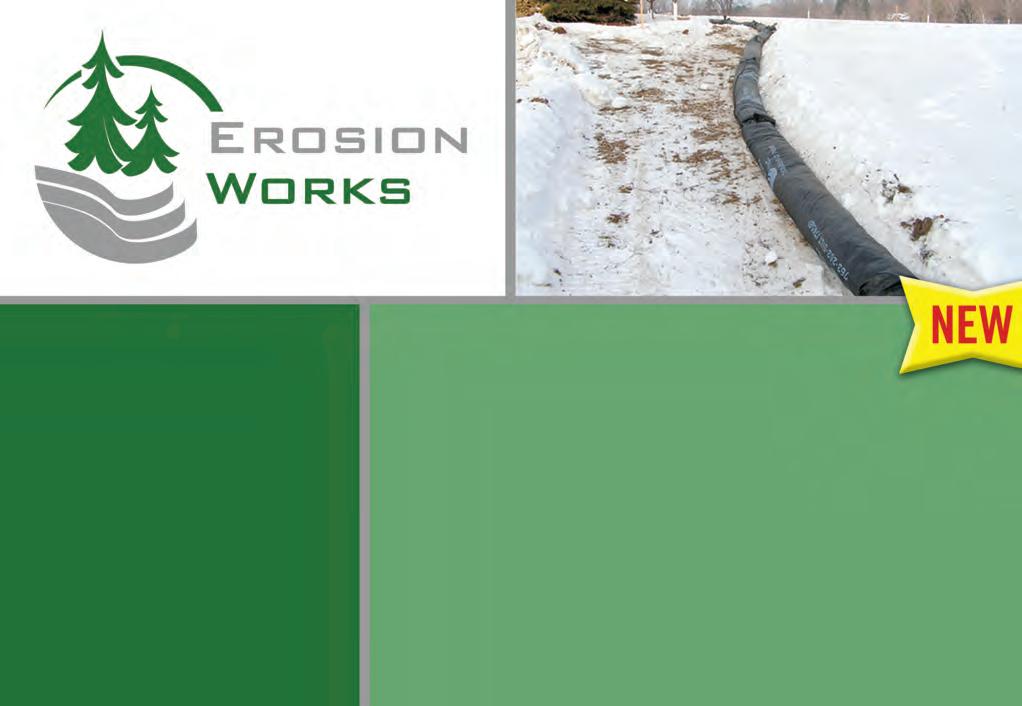
Exceptional Service. Always. 763-262-SILT (7458)



It is a 10” geotextile fabric sewn together and filled with recycled wood product. It’s reusable and can be easily moved to another location. The Minnesota Mulch Log is a very effective perimeter control device and is more aesthetically pleasing providing a great alternative to silt fence.
• Reusable
• Low Maintenance
• Ditch Checks
• Cost Effective
• Inlet Protection
• Perimeter Control
• Easy to Install
• Self Anchoring









Skuna Bay Salmon is cultivated with meticulous attention to the health and welfare of the fi sh, as well as preservation of the pristine conditions of natural waters. Their approach to salmon farming is rooted in a profound respect for nature and the ecosystems that support life. Kowalski’s is proud to partner with Skuna Bay Salmon as the exclusive retailer in the Twin Cities market.










